The wonderful Roswitha Schneider had an “eye” on us throughout the StoryCamp. And she did a phantastic job capturing the different moments, settings and the emergent quality of our time together. Enjoy!

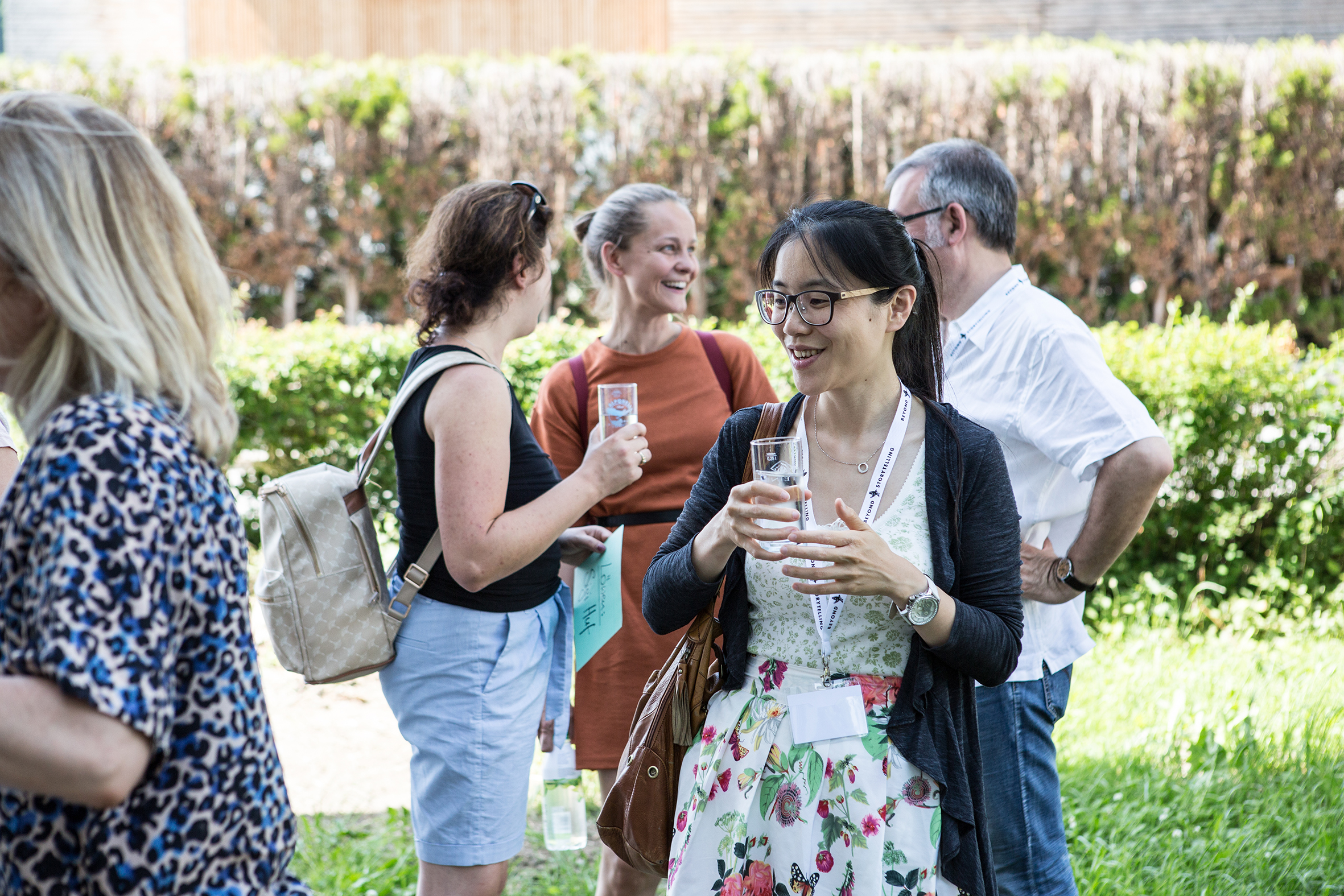
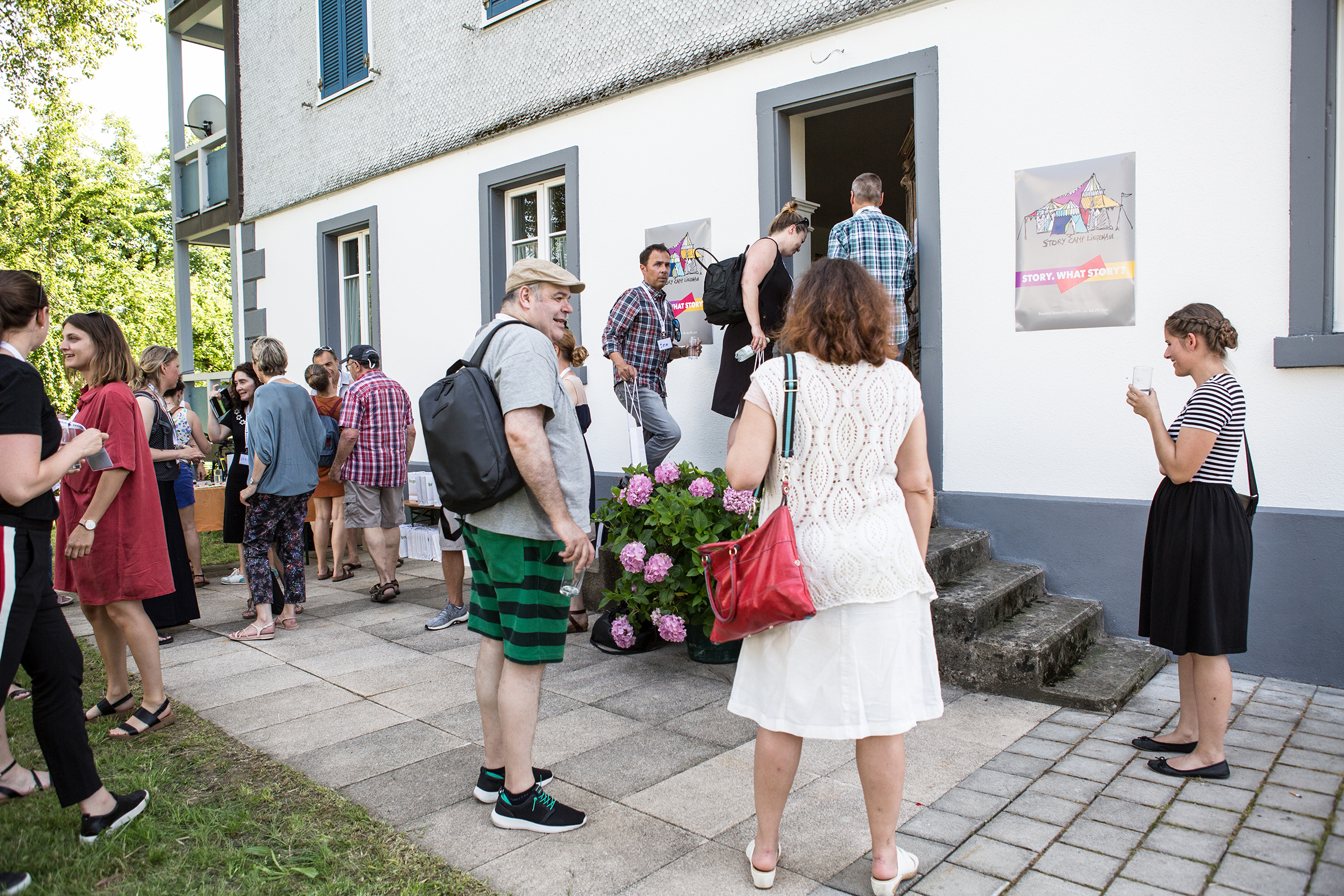


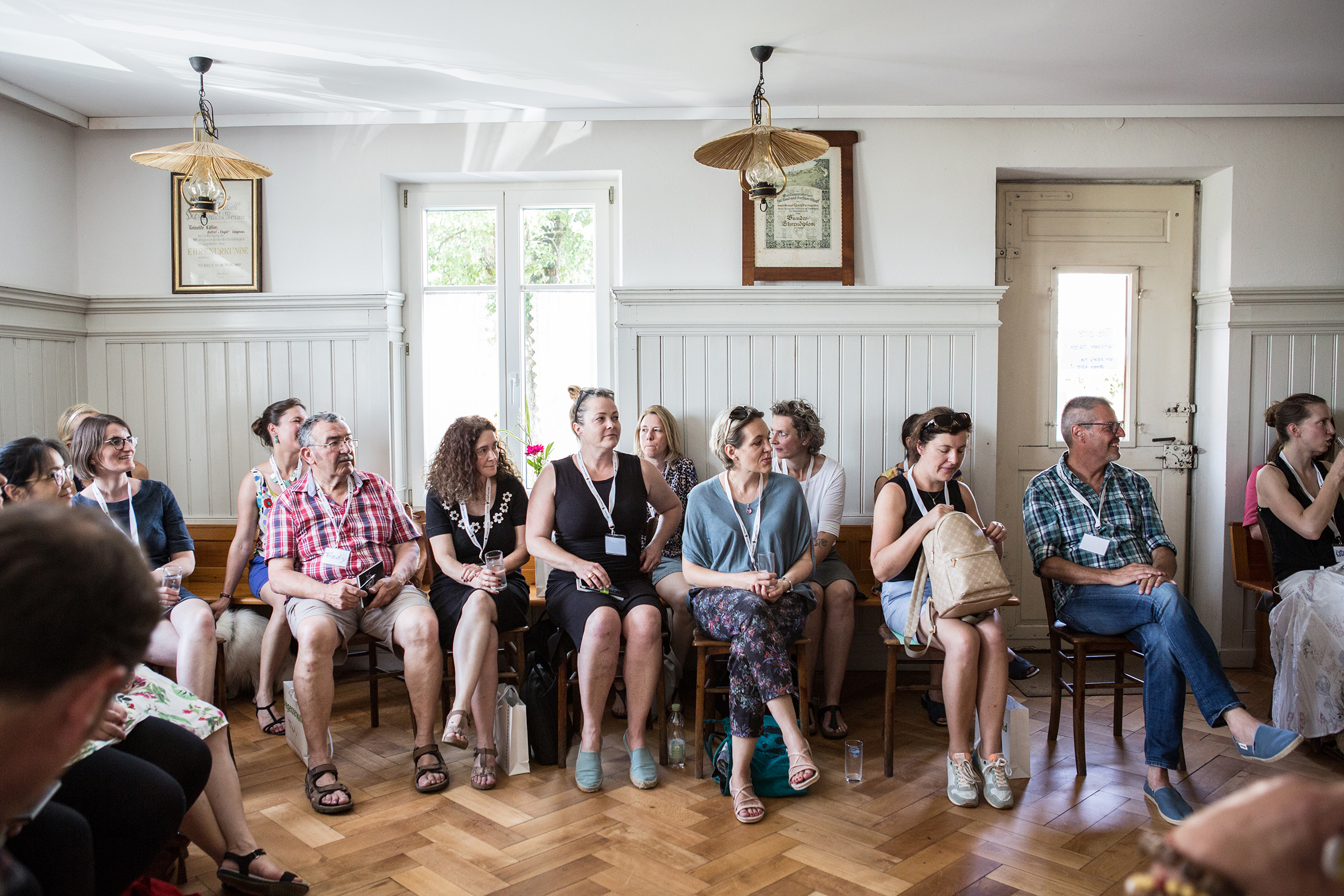
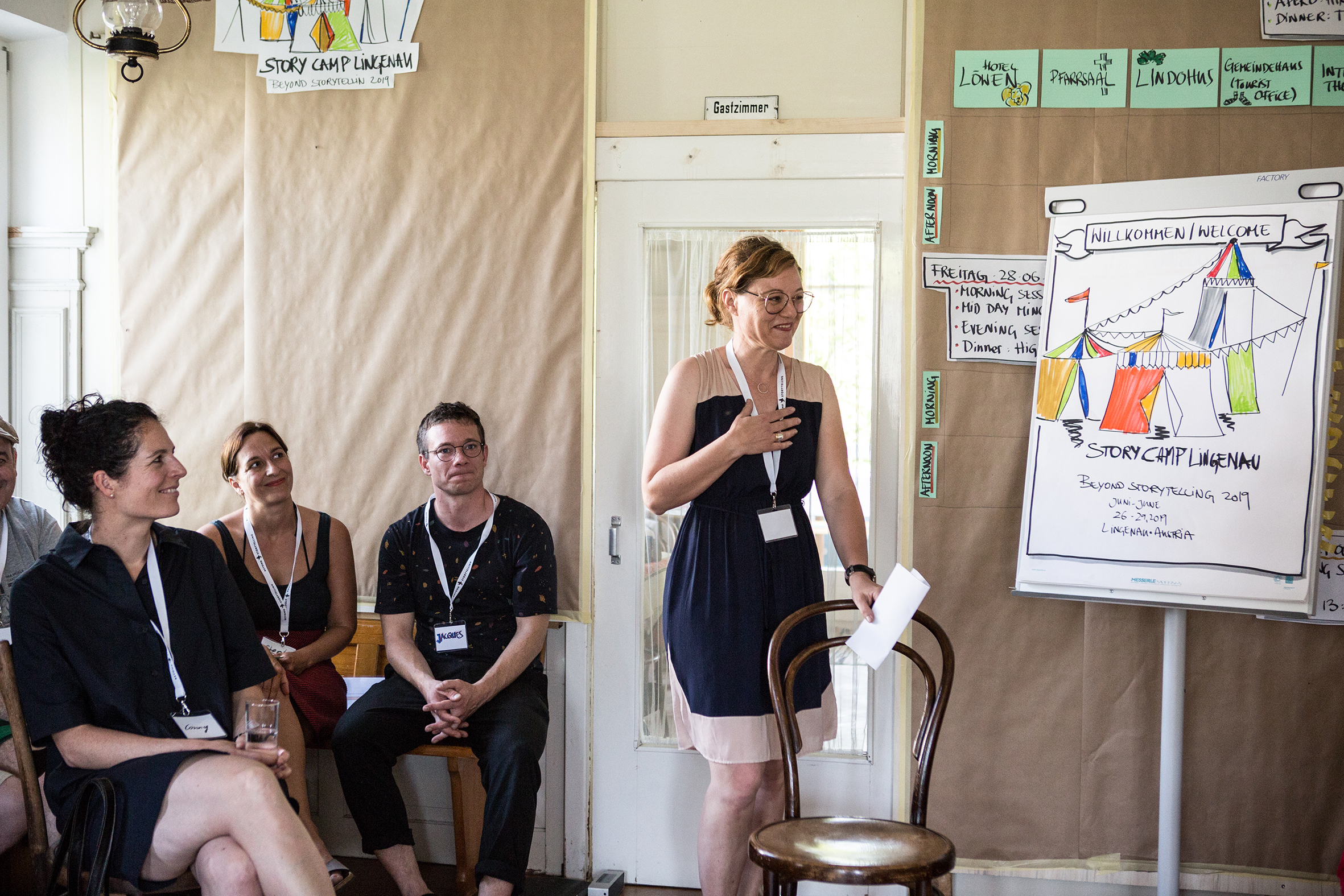
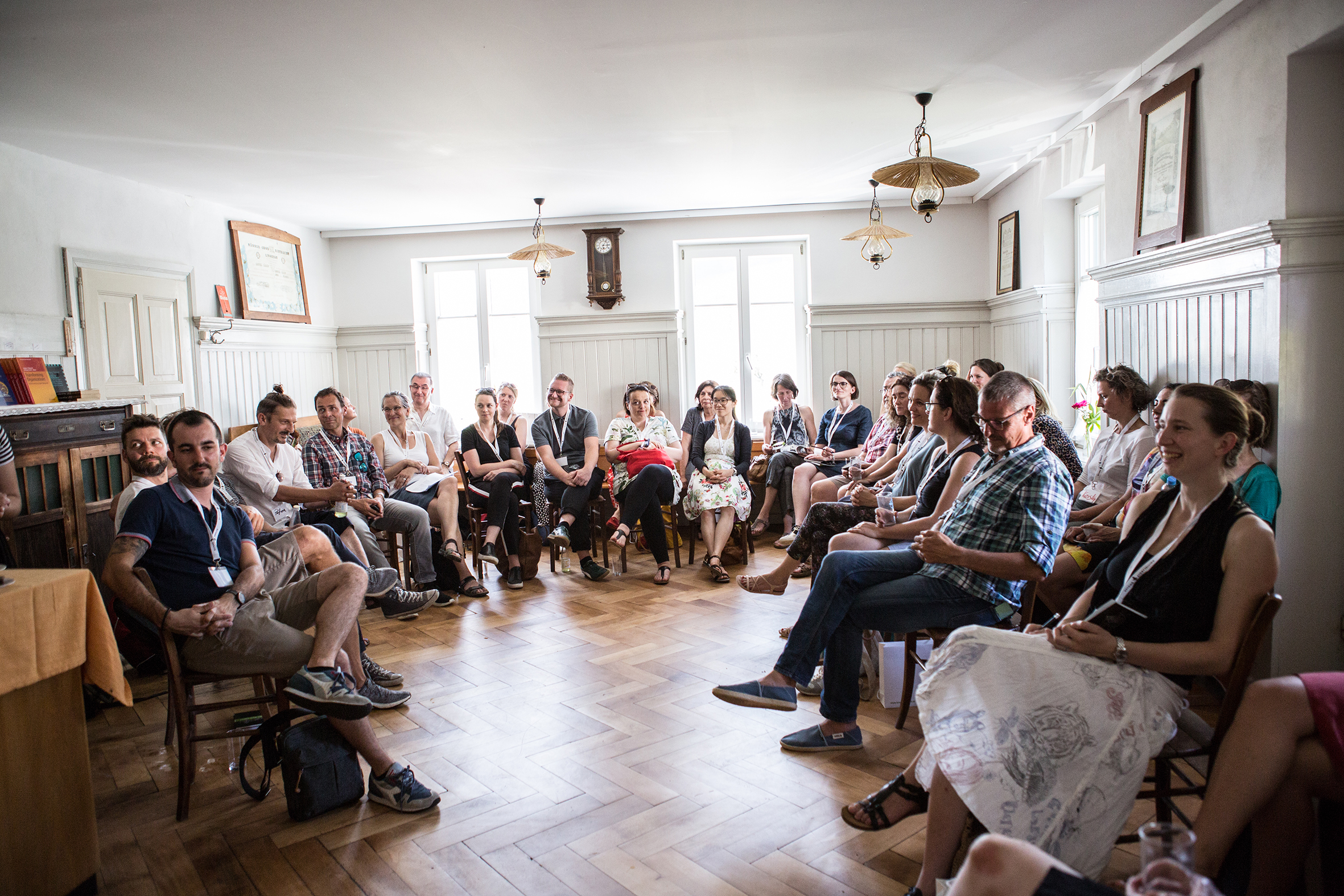

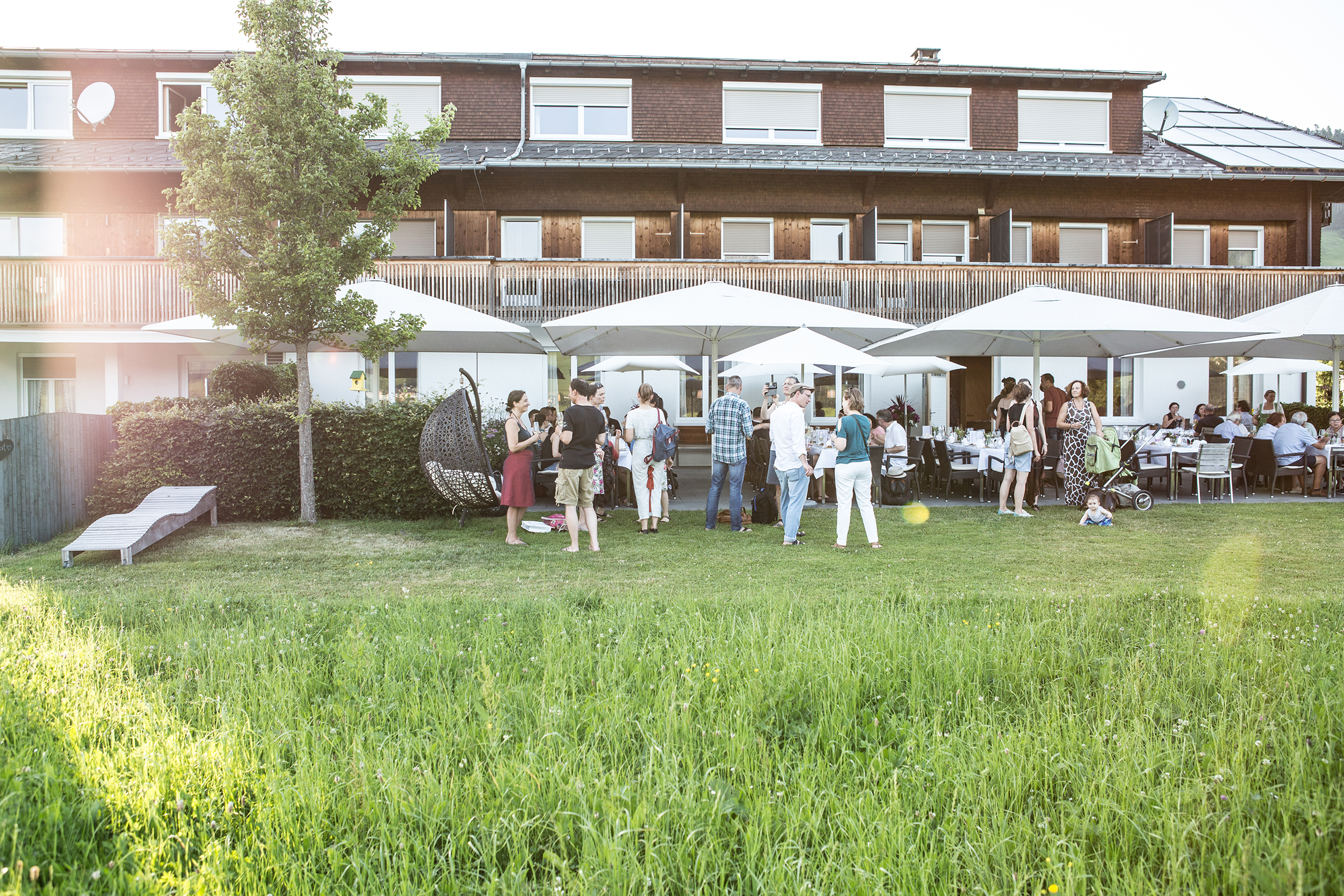
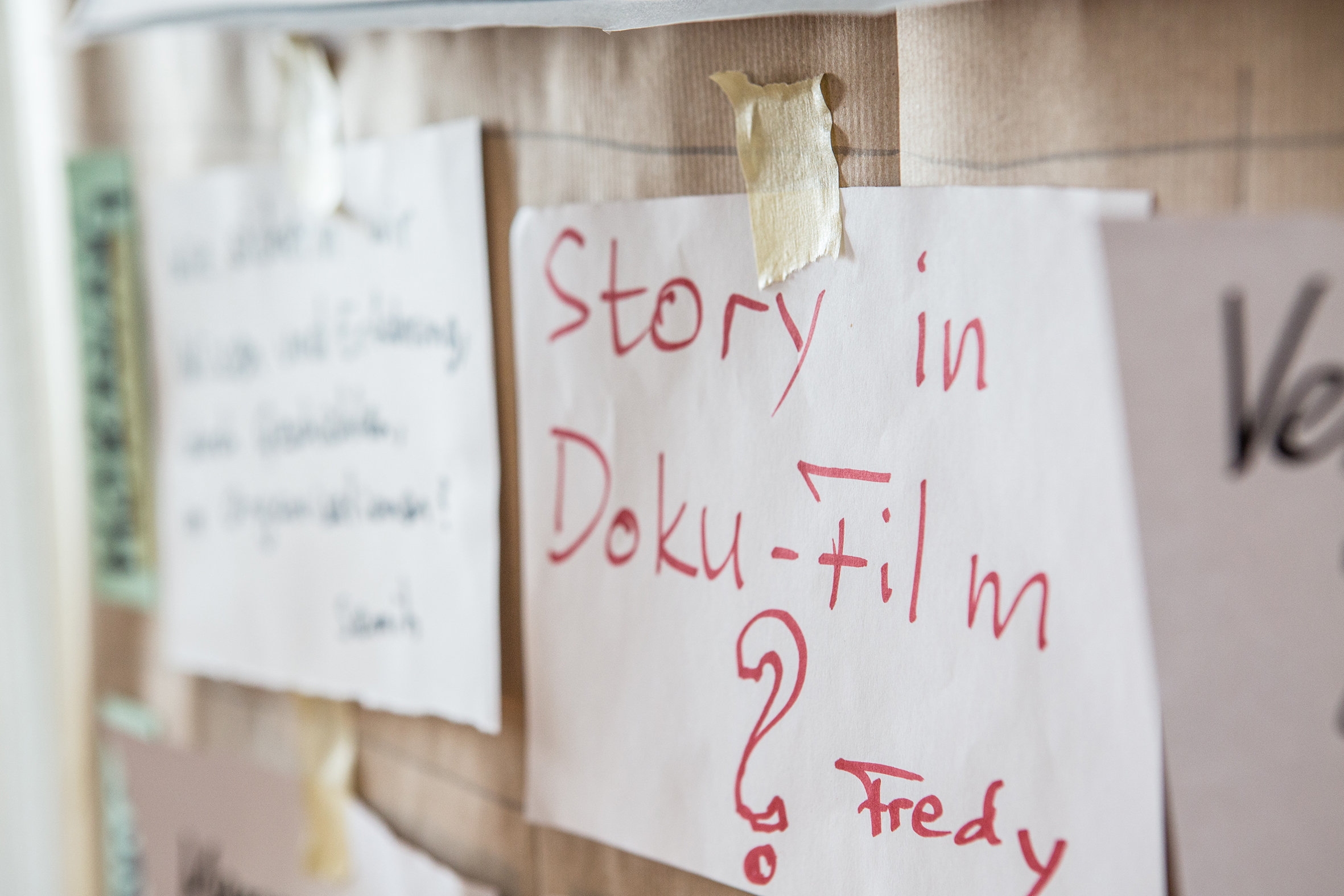
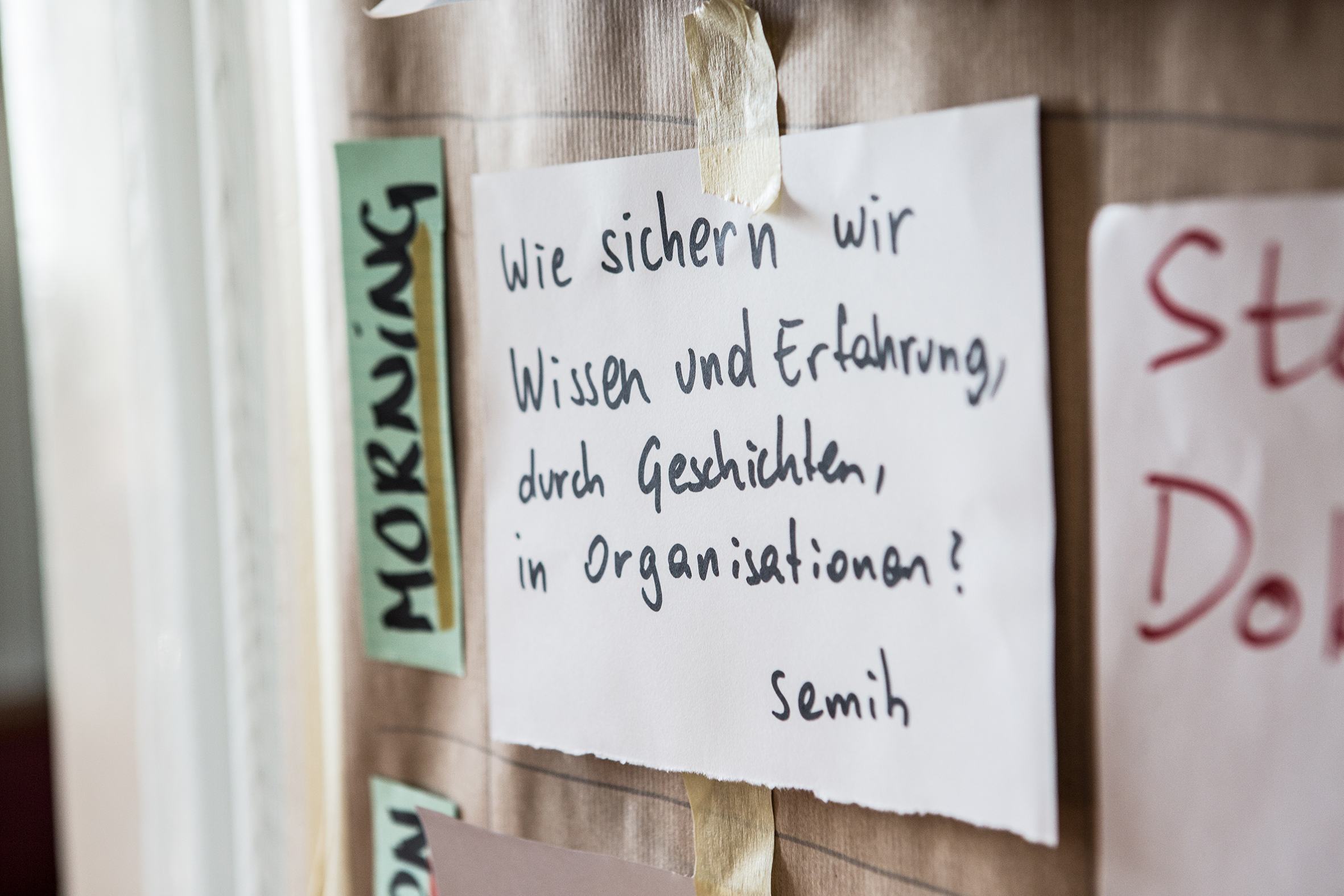
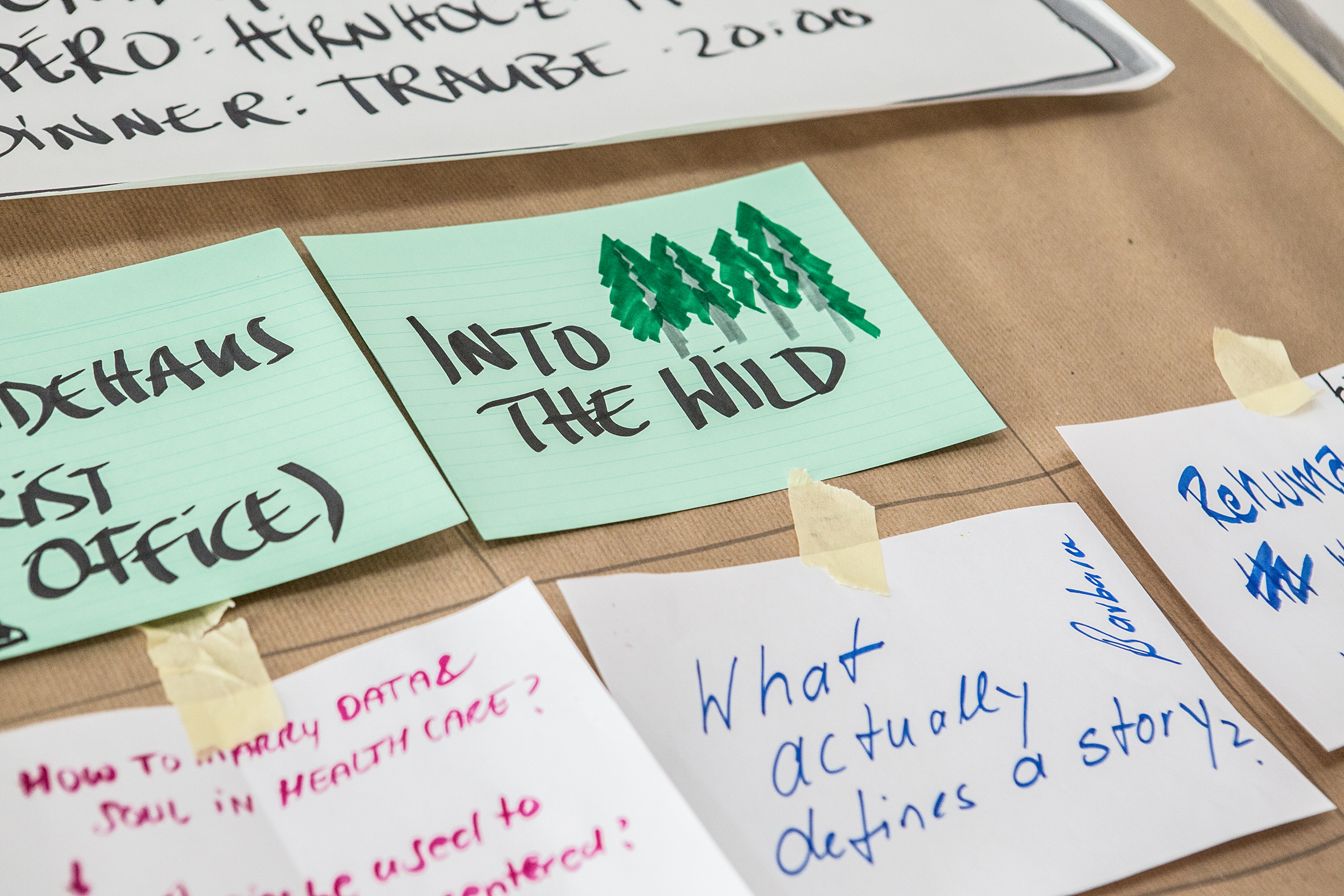
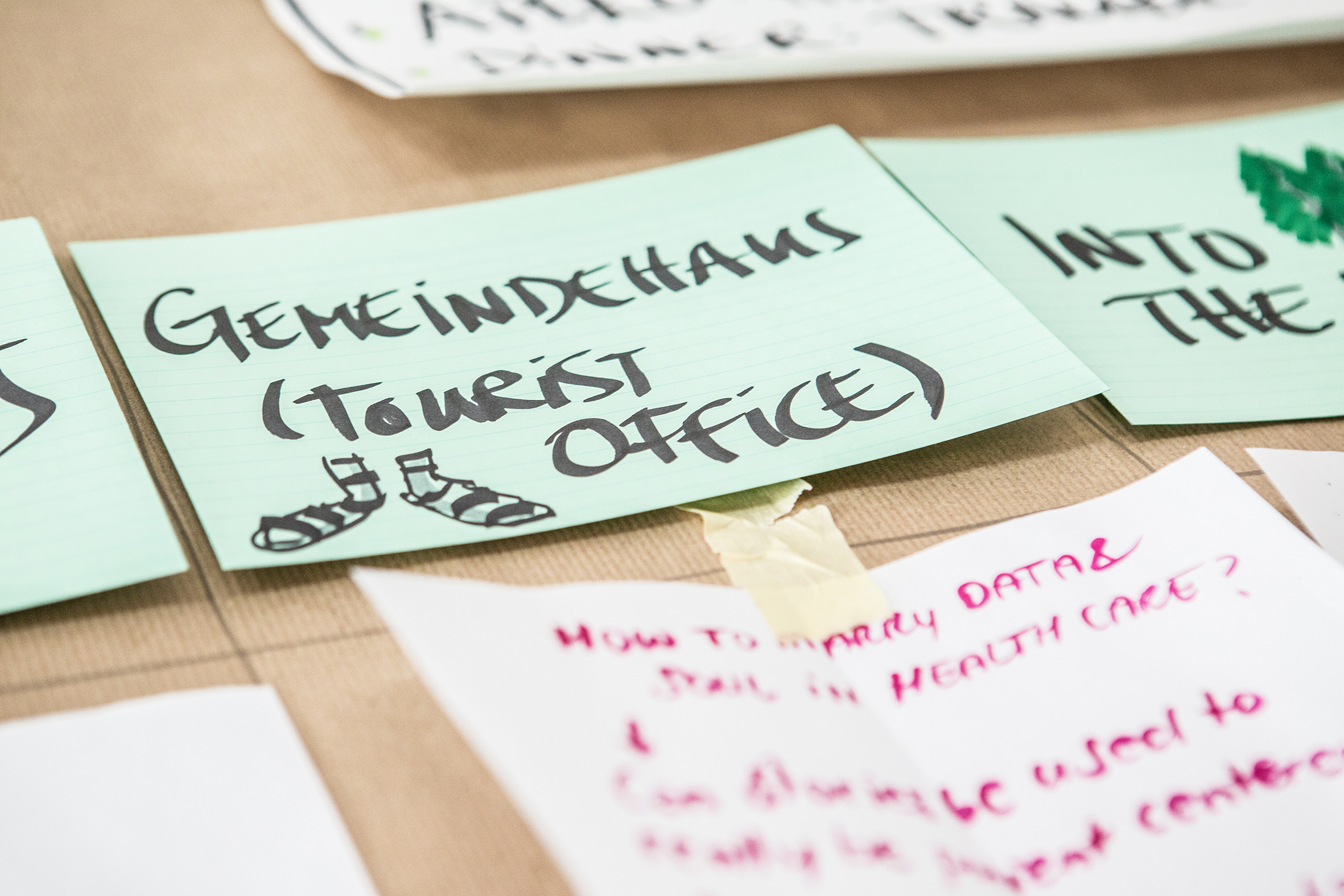
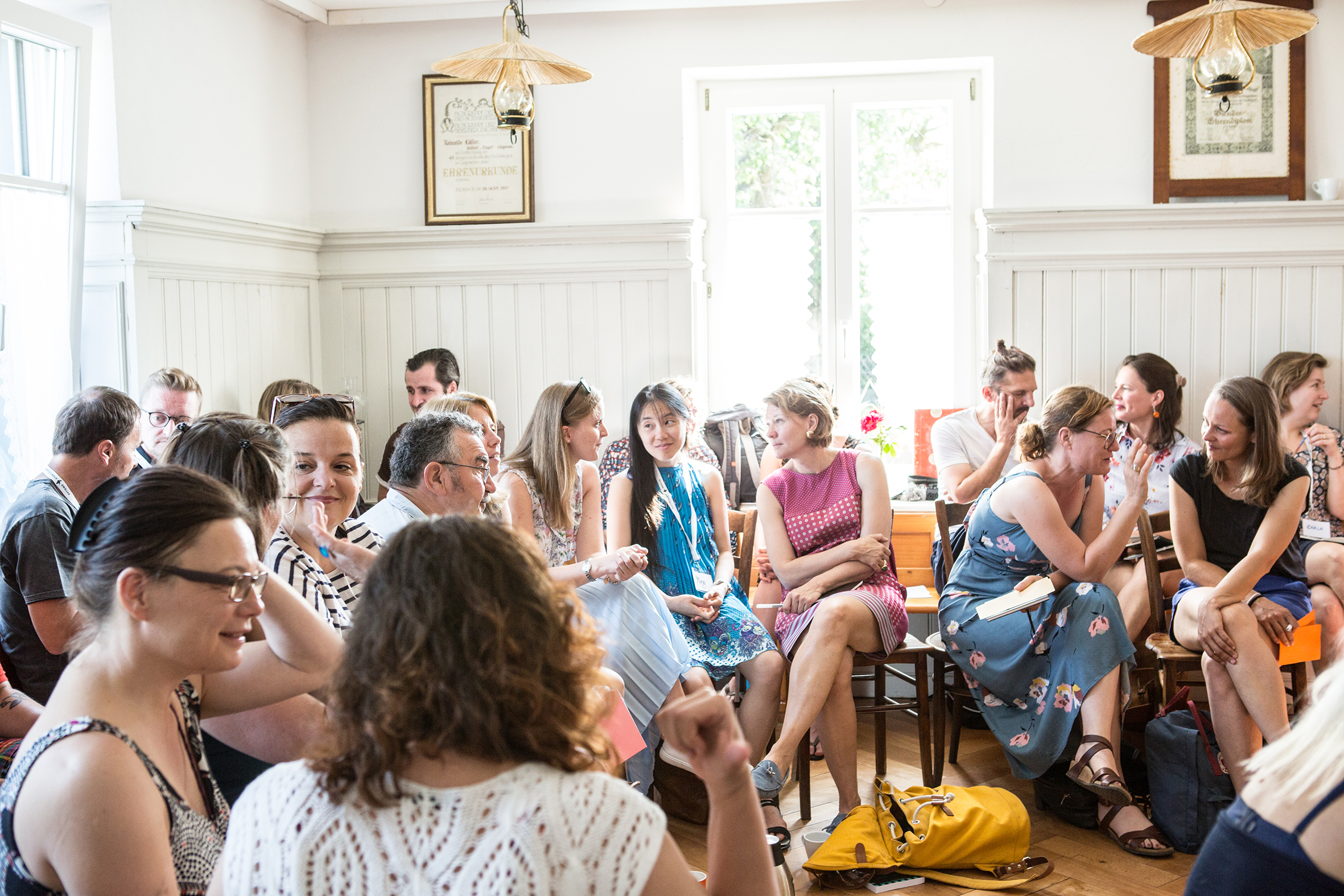
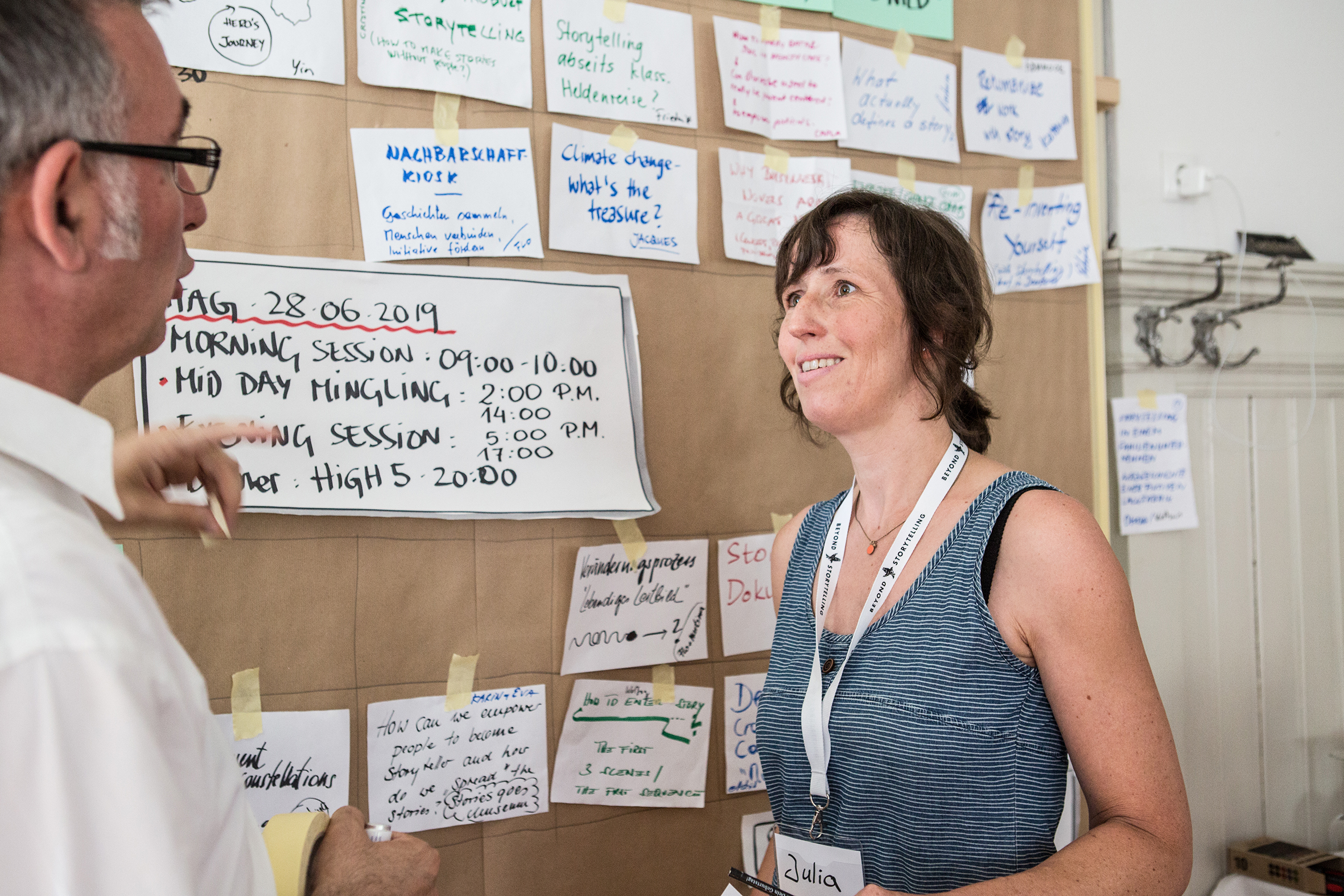
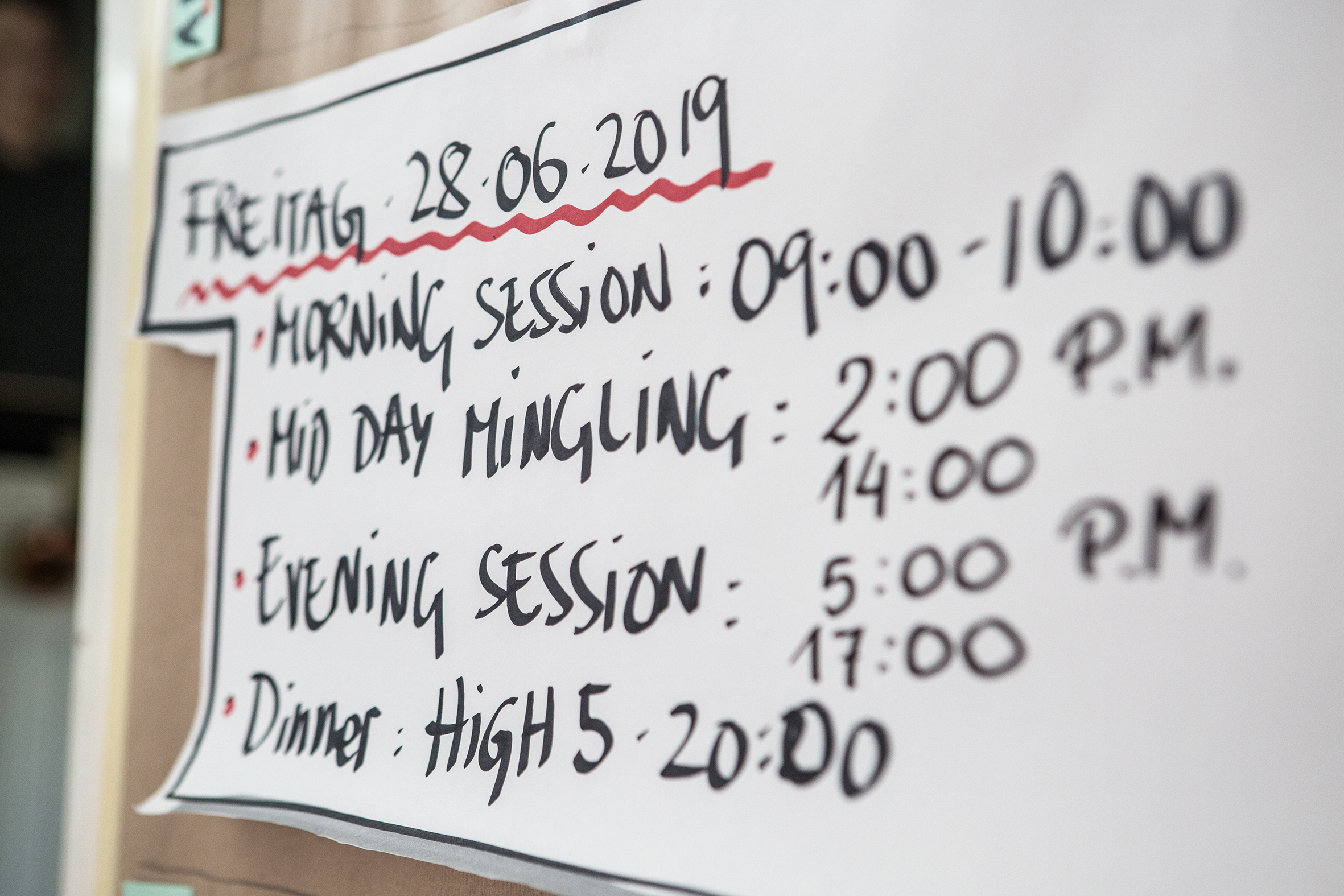
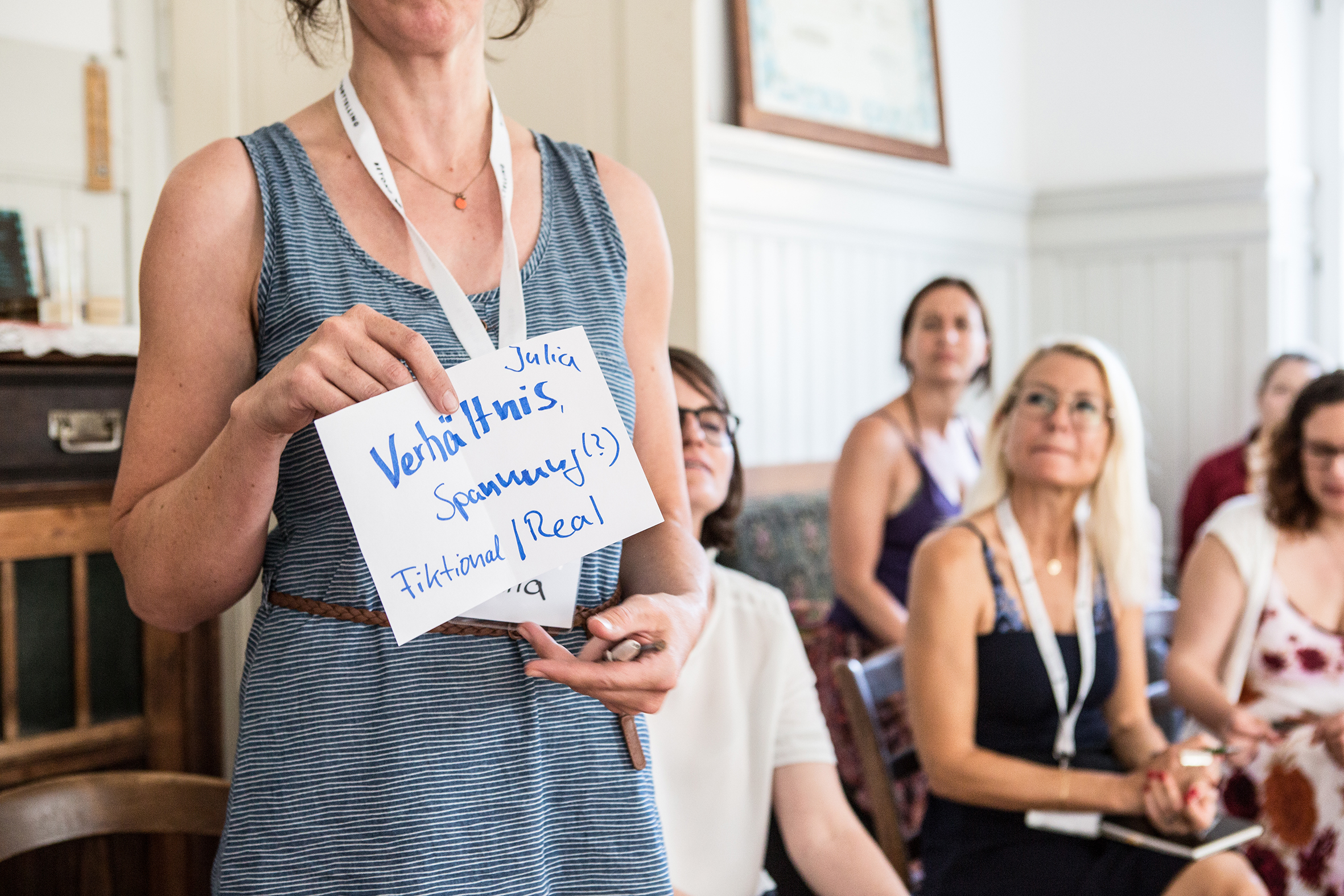
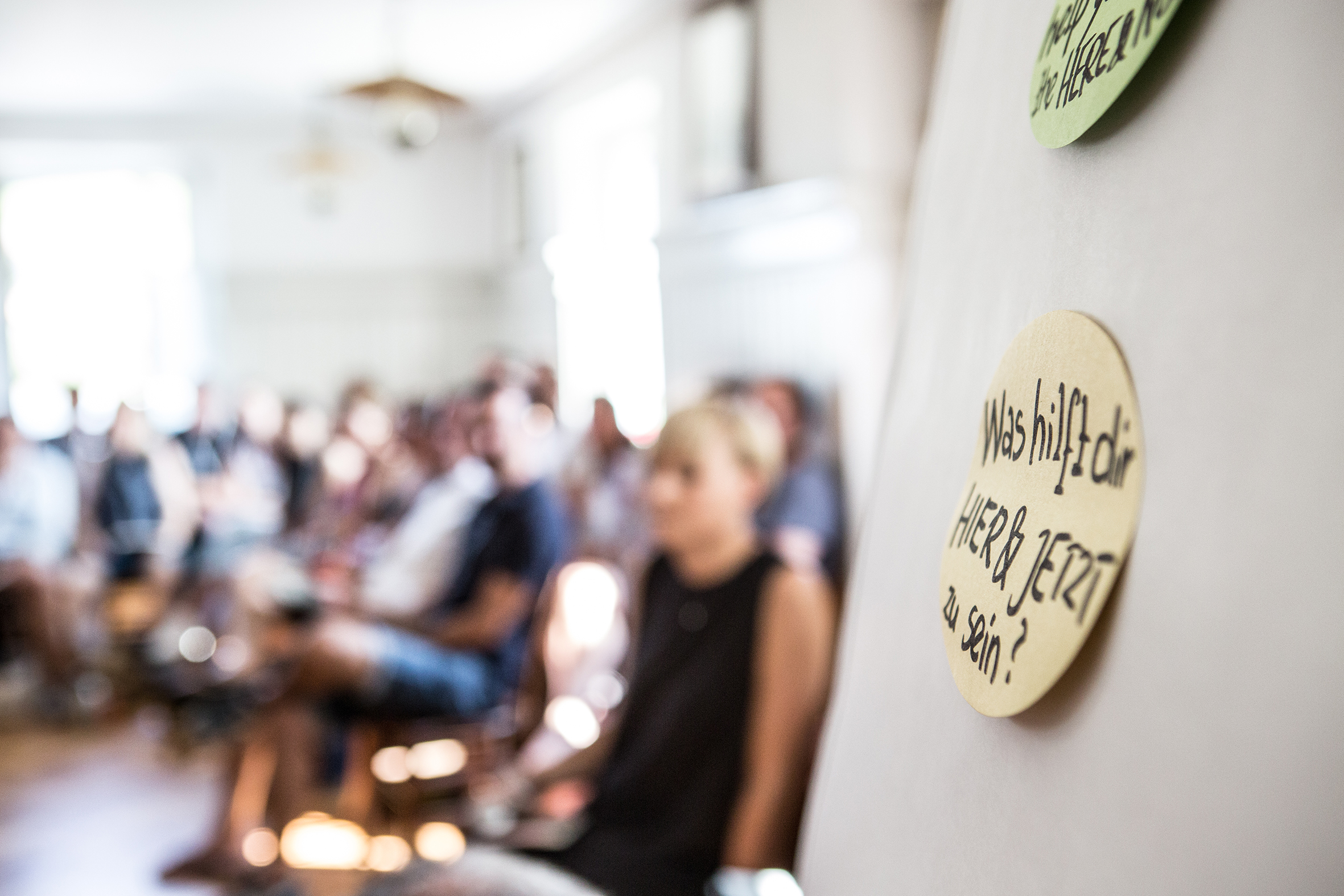
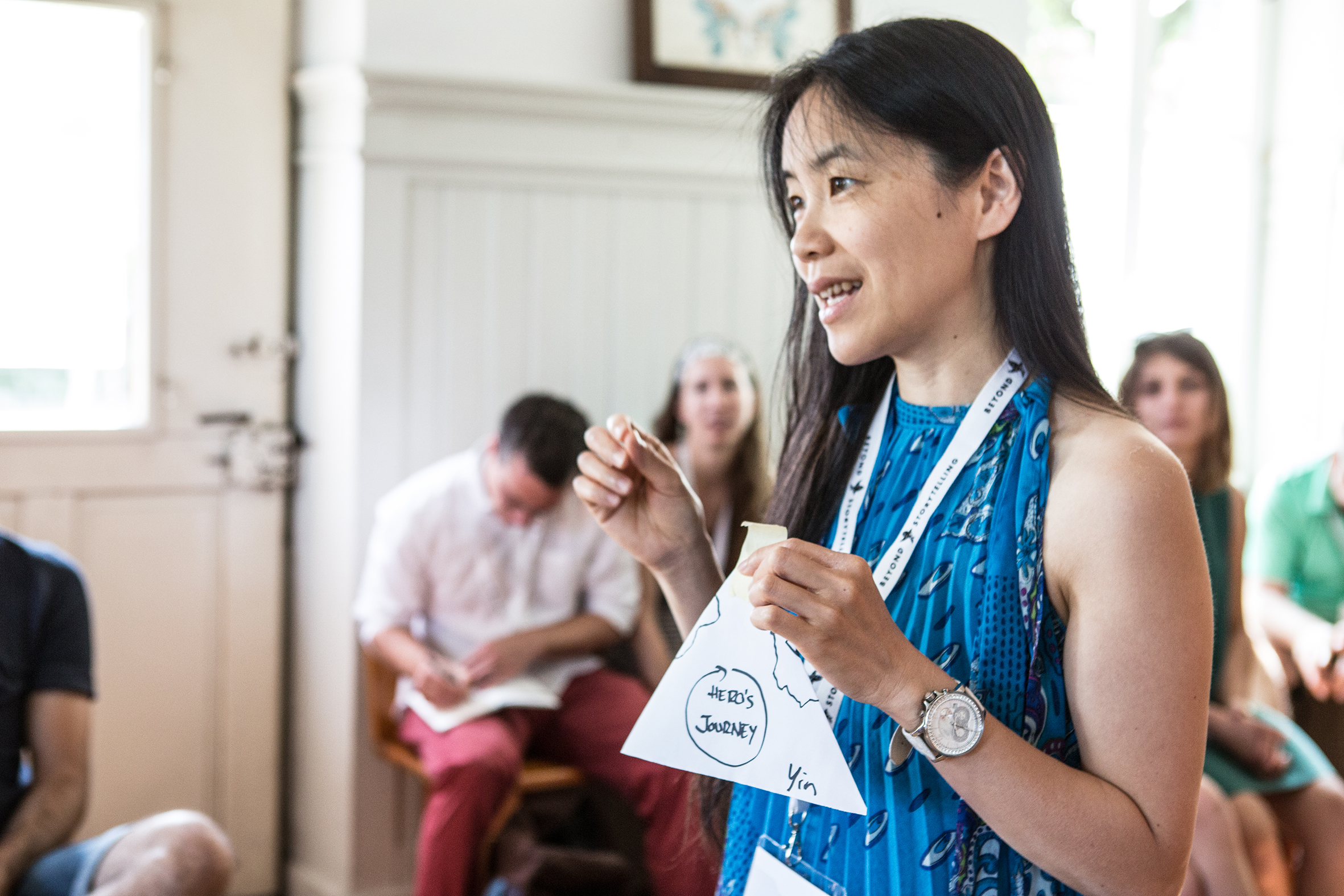
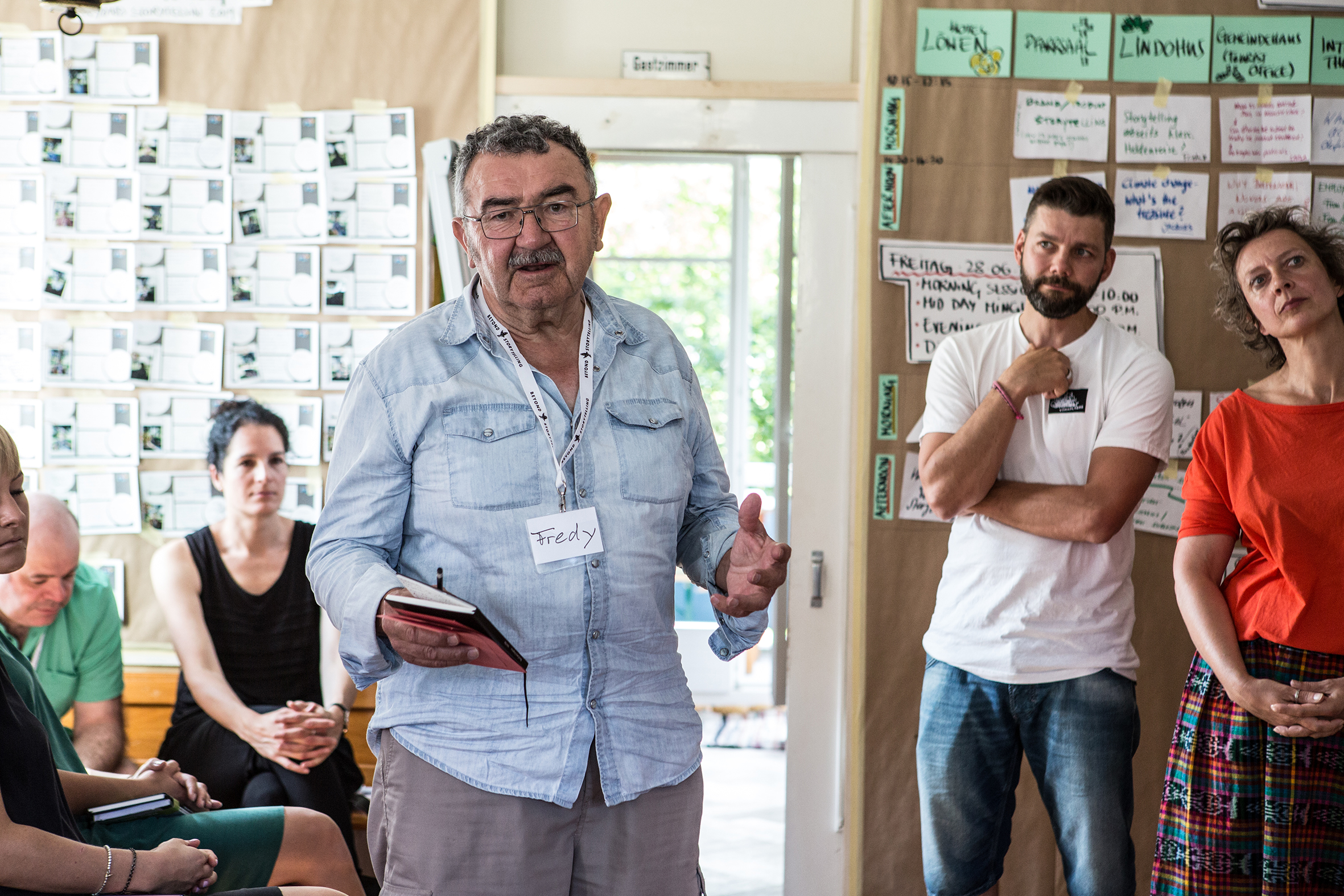
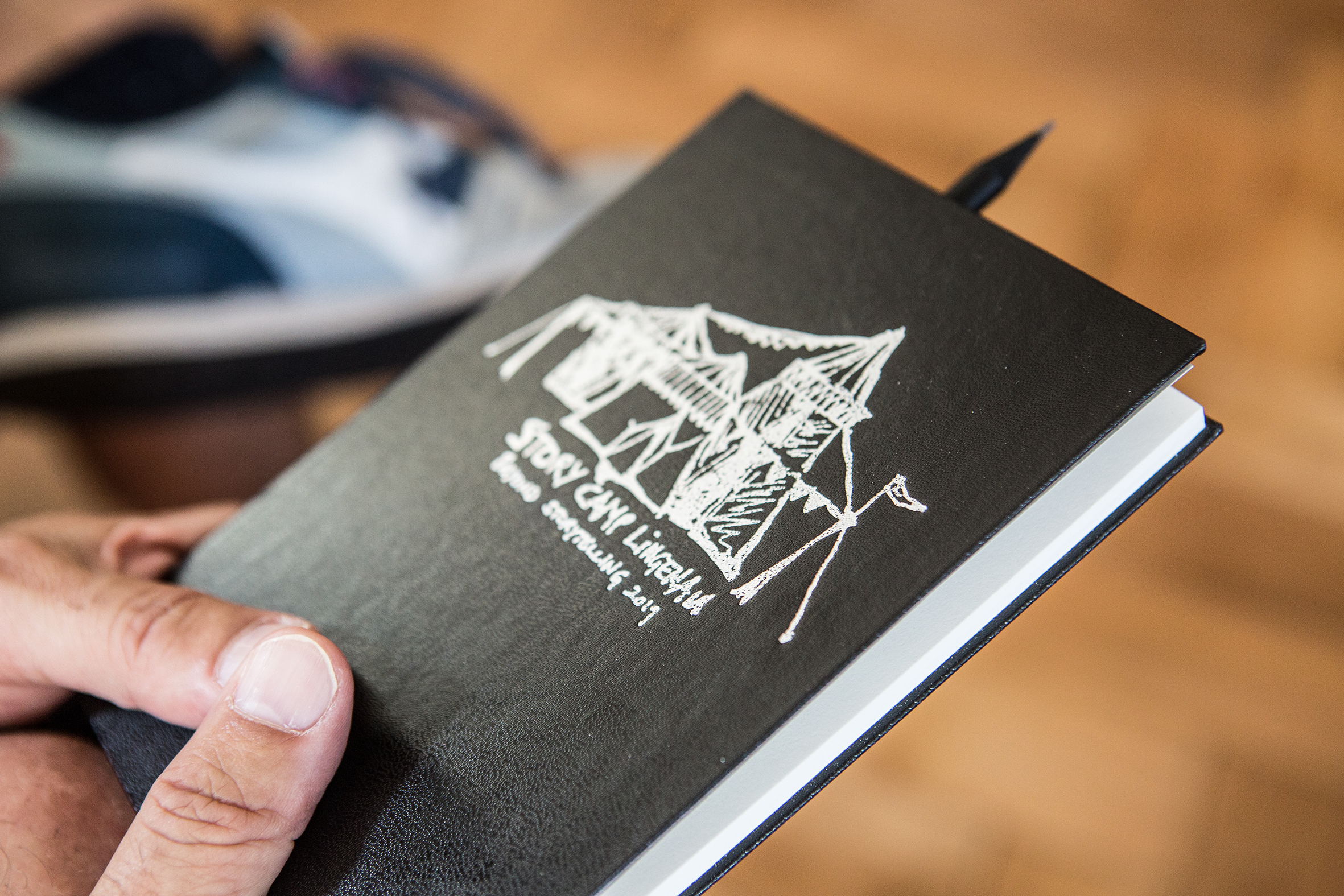

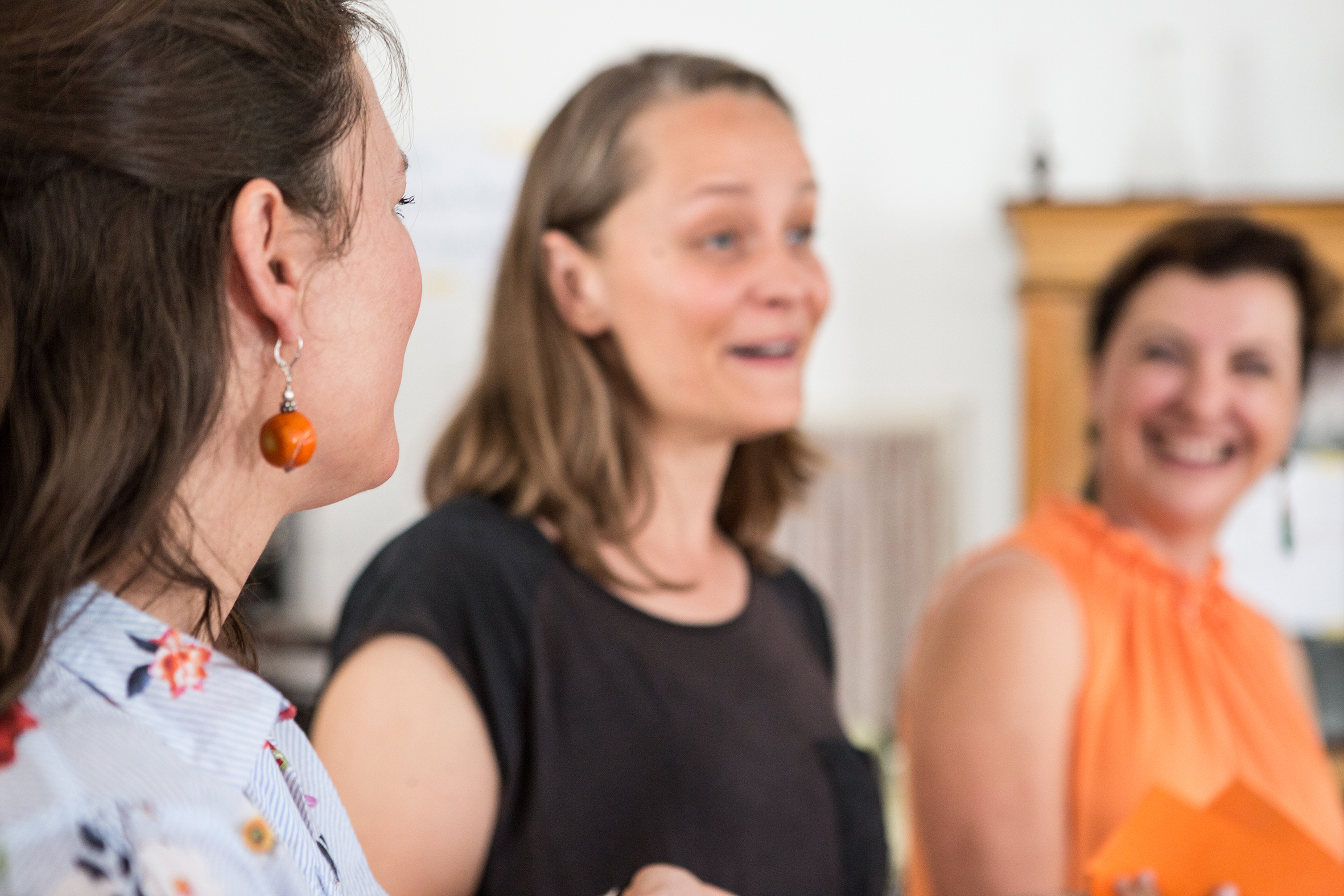
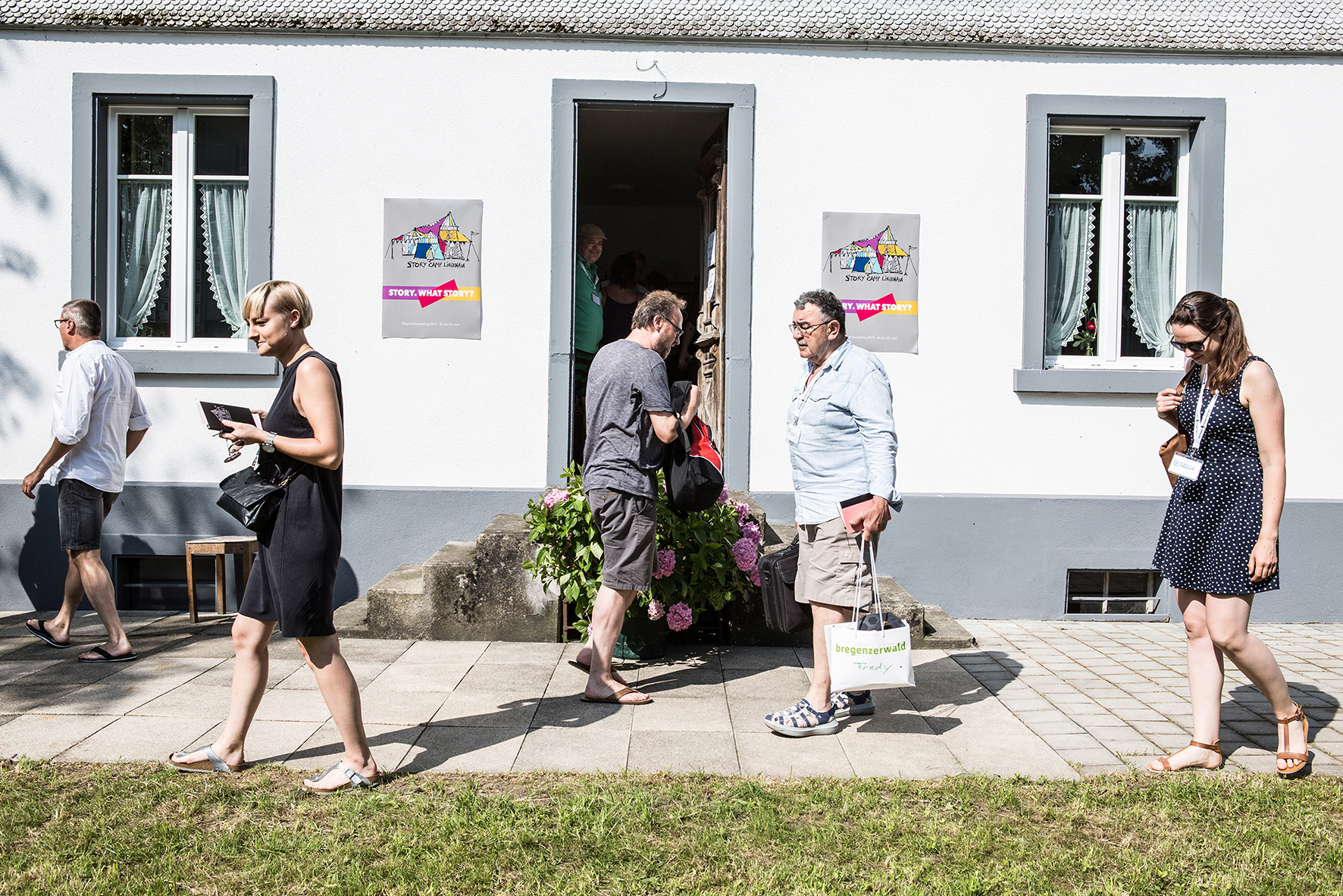
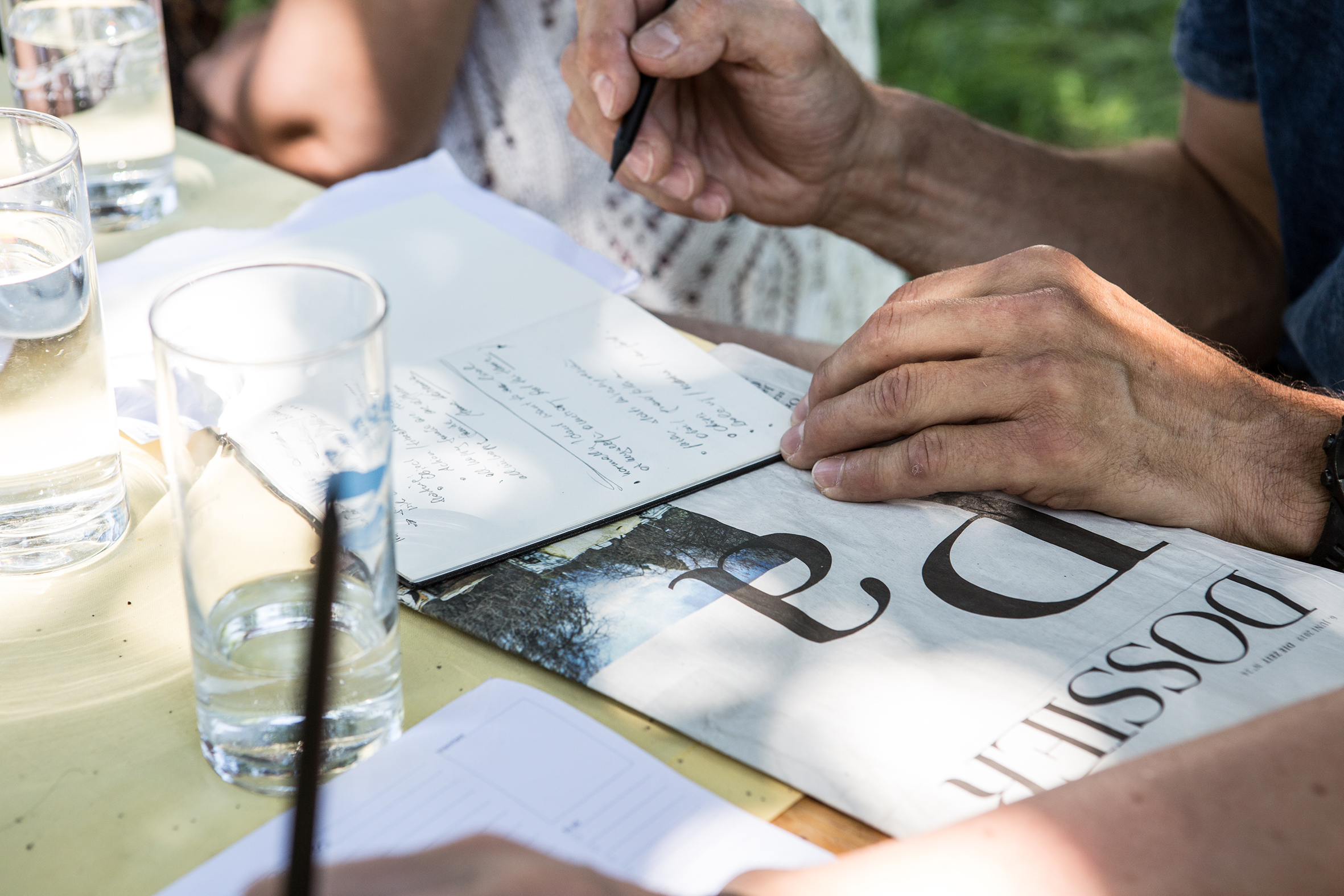
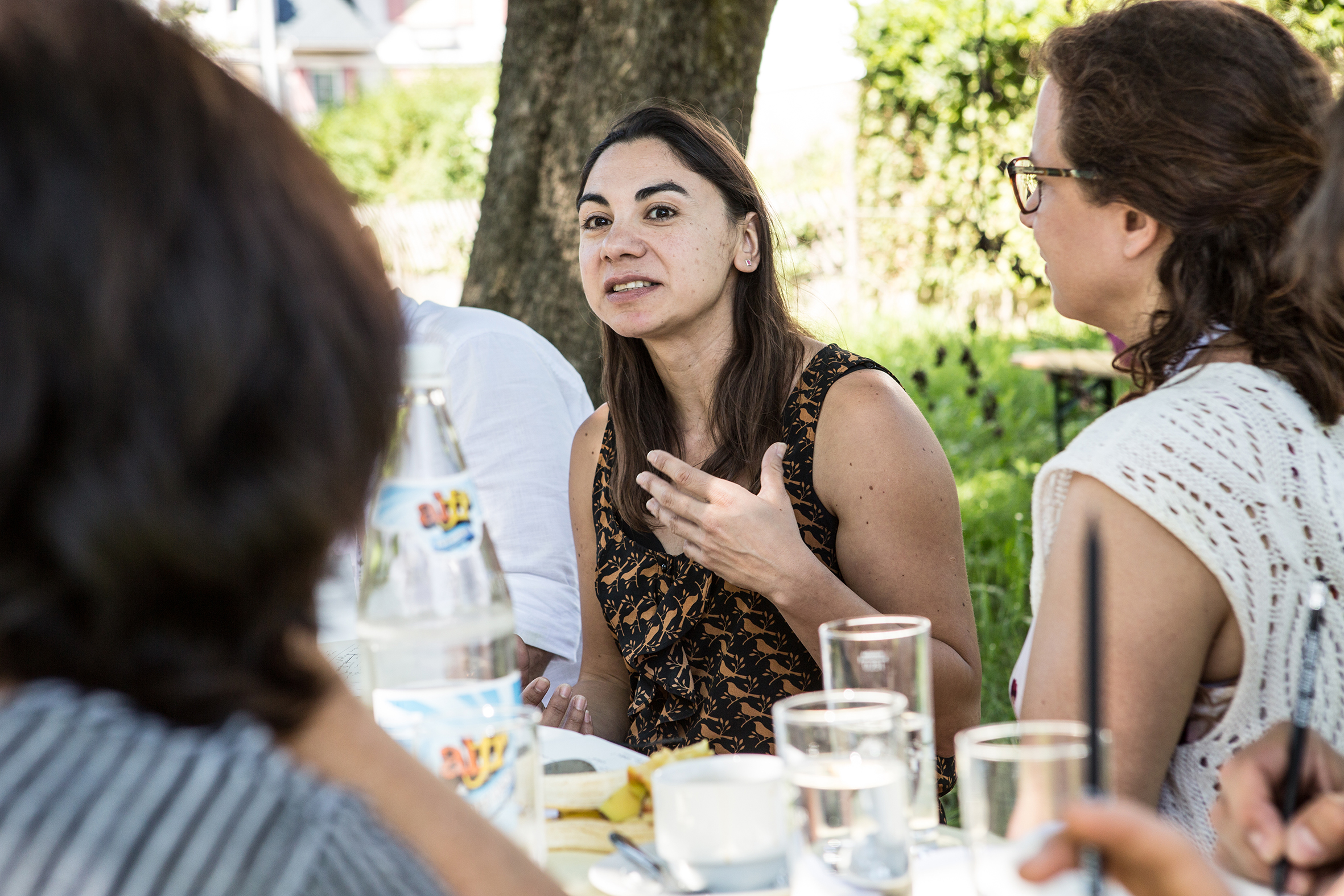

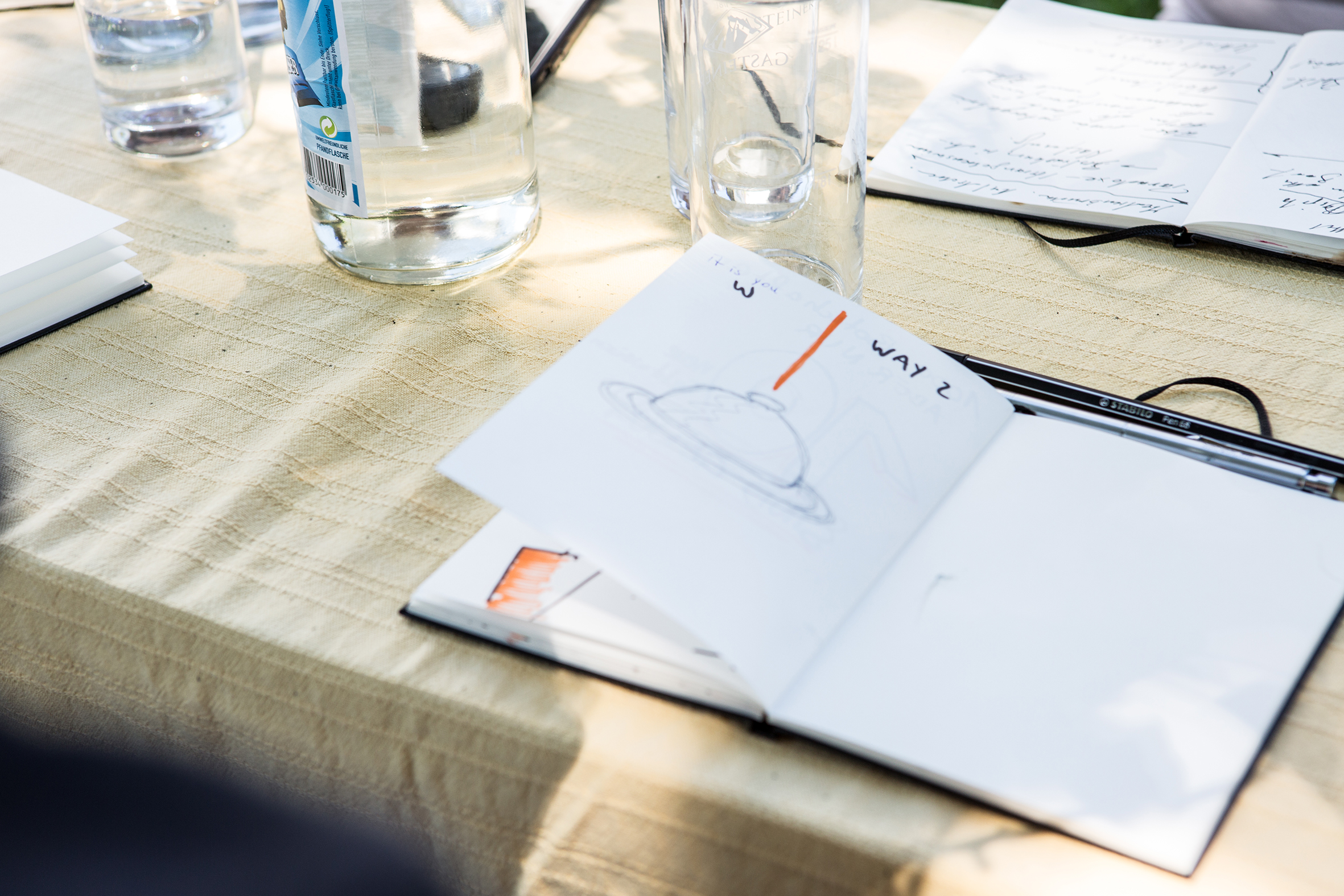
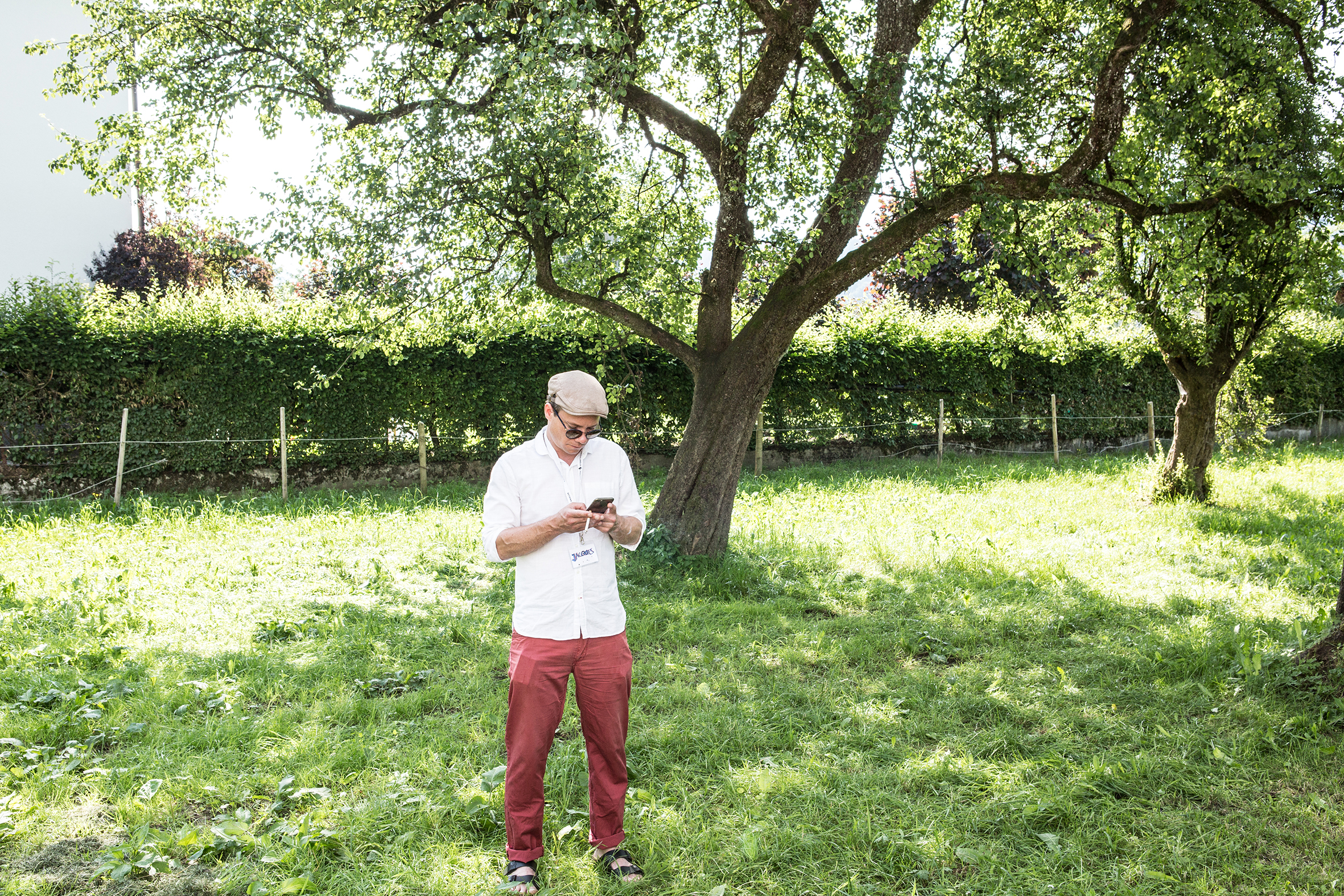
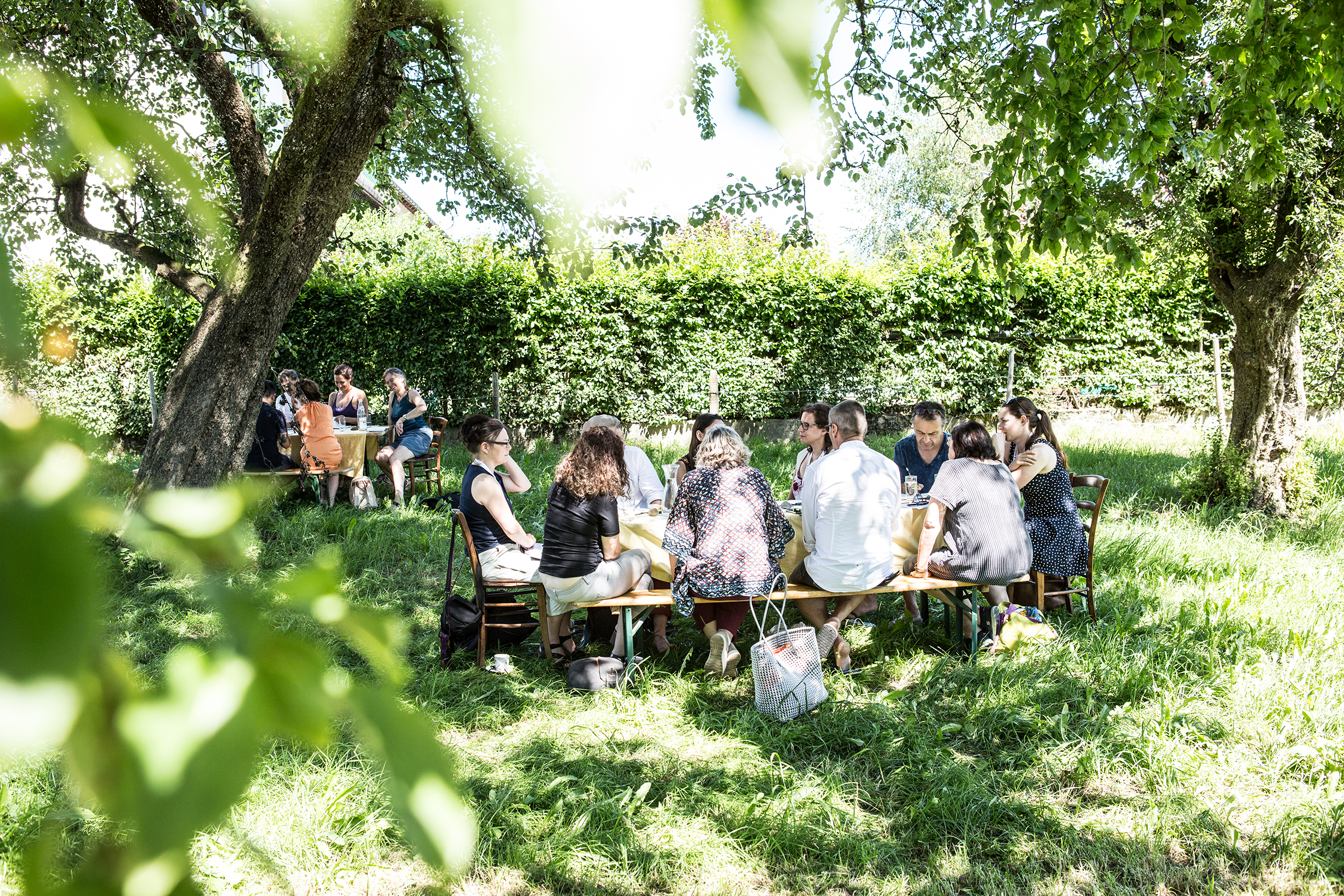
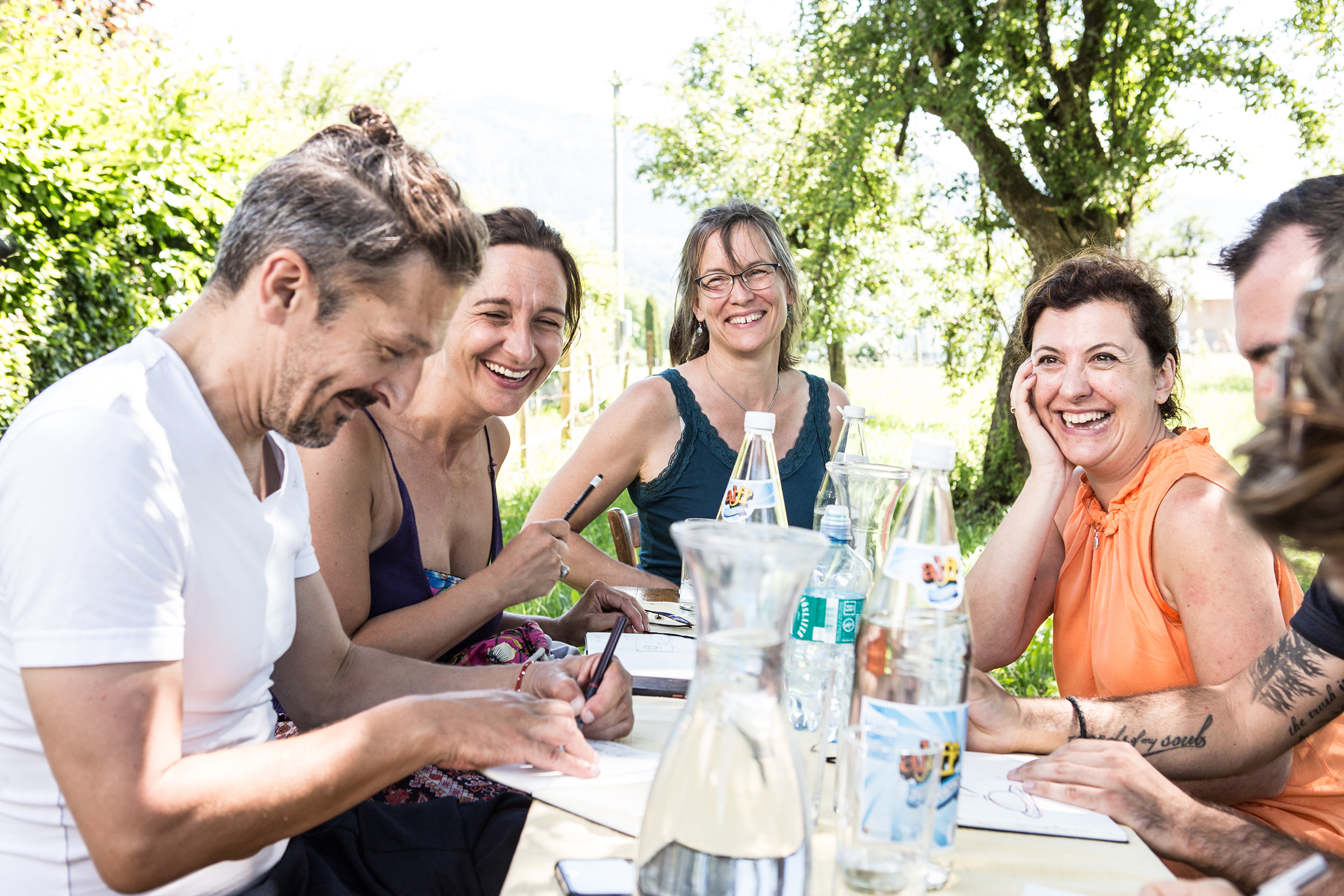

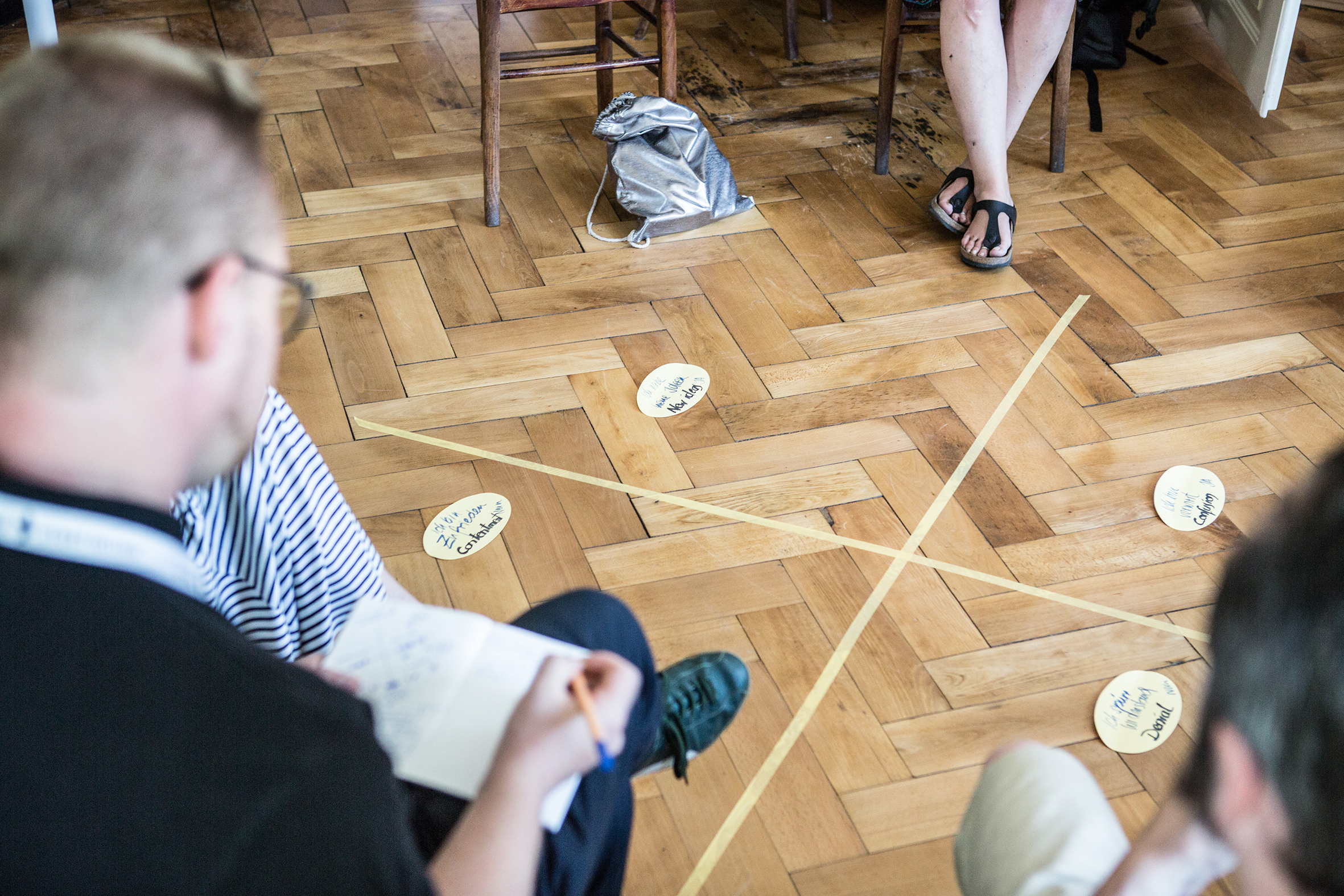

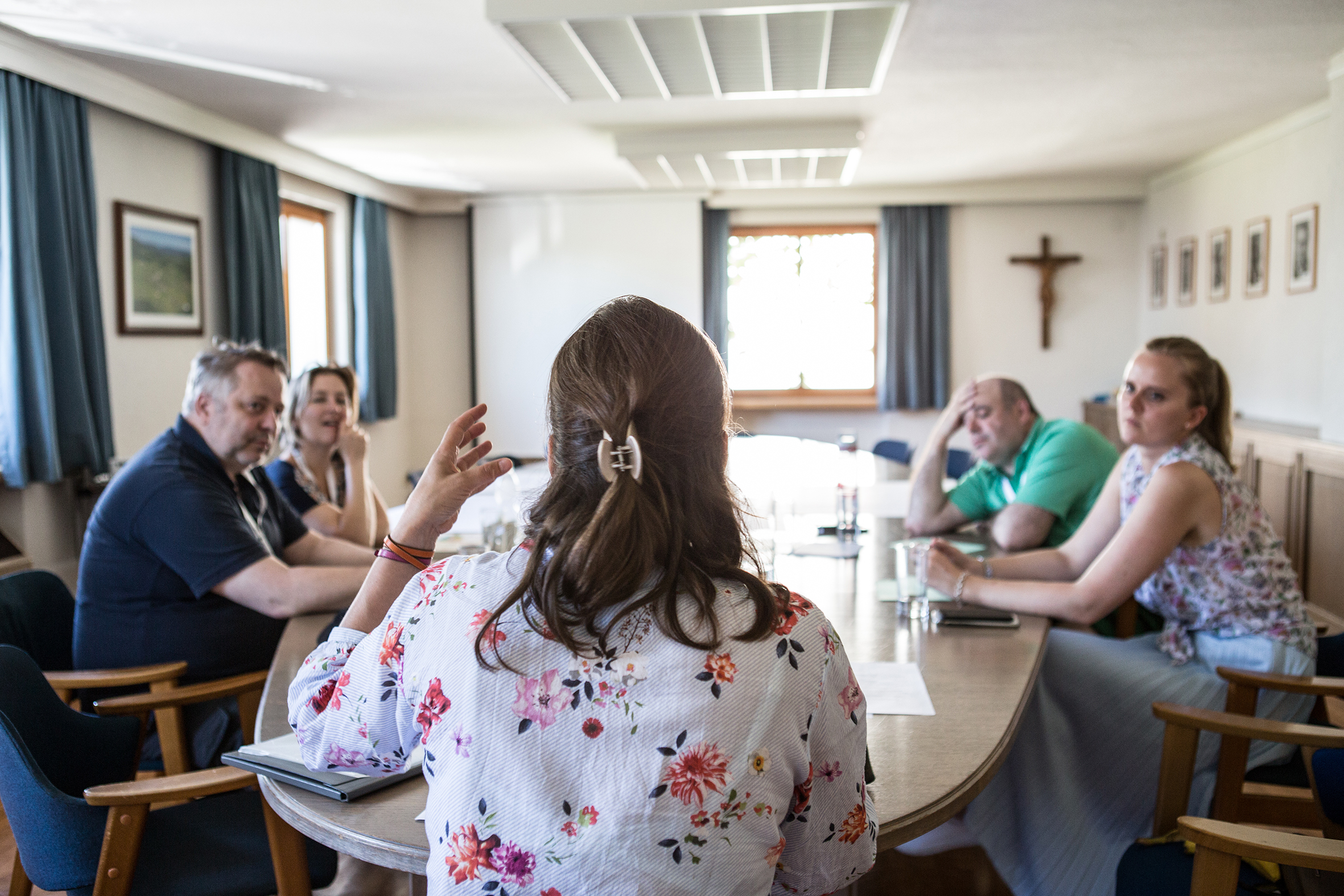
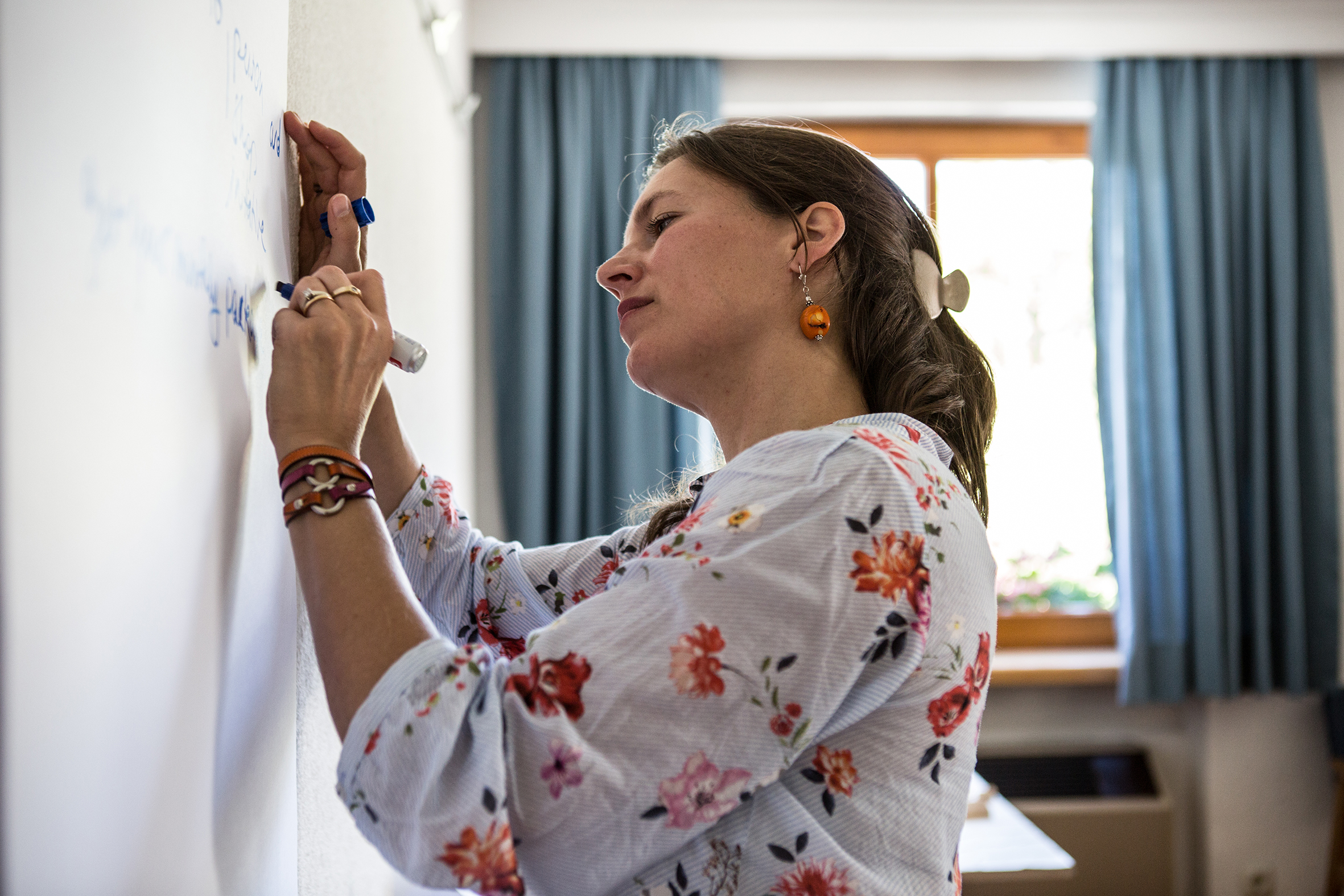
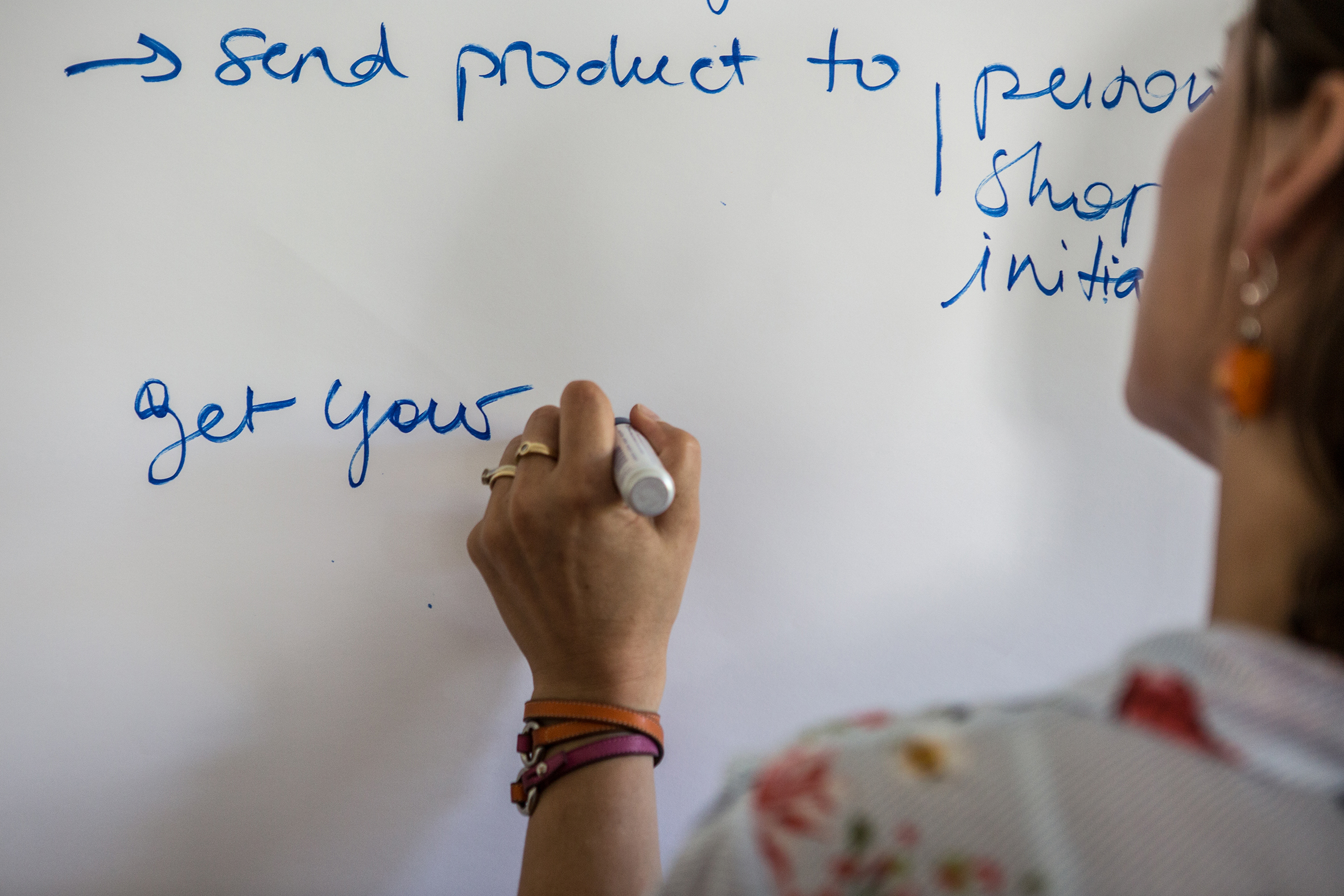
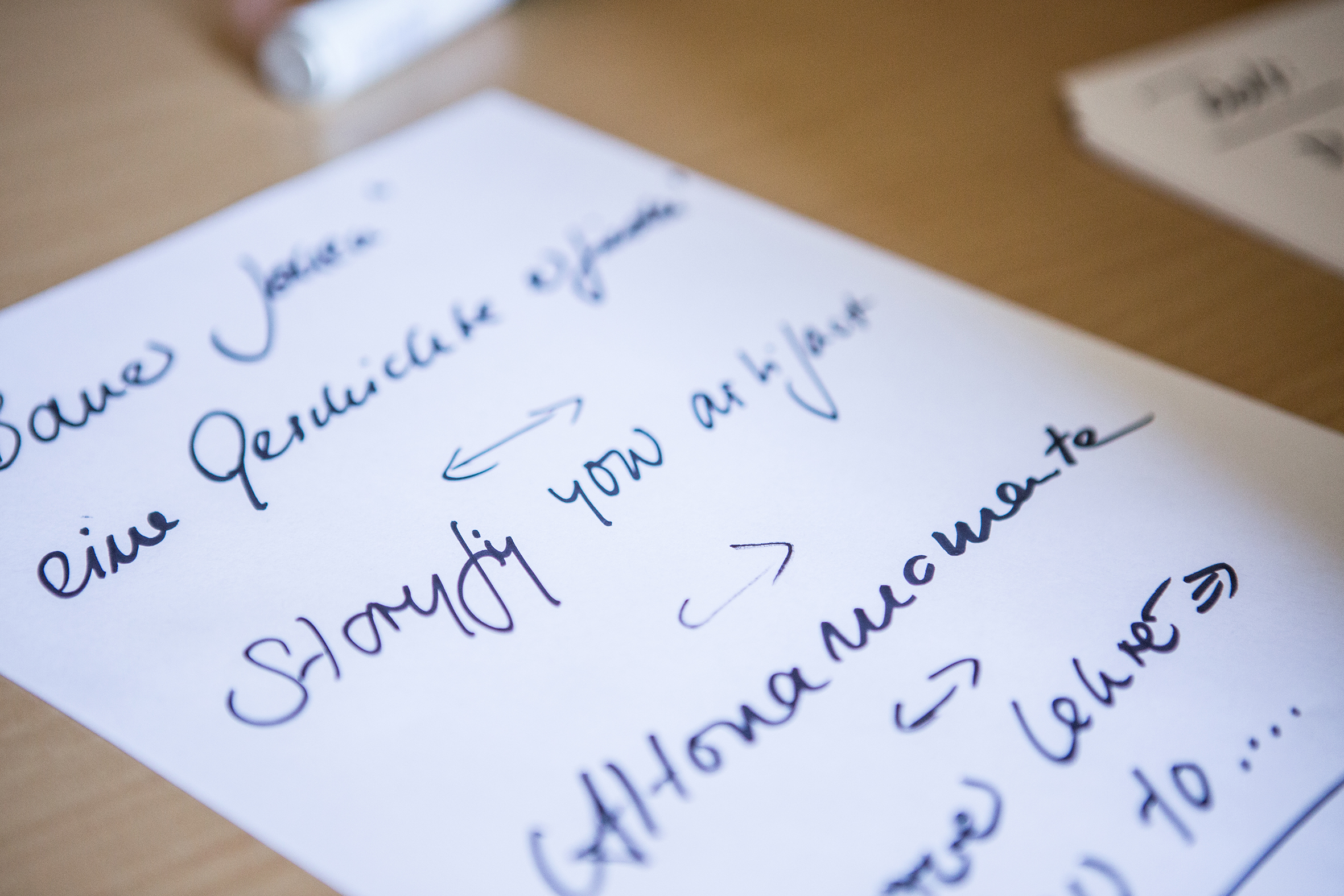
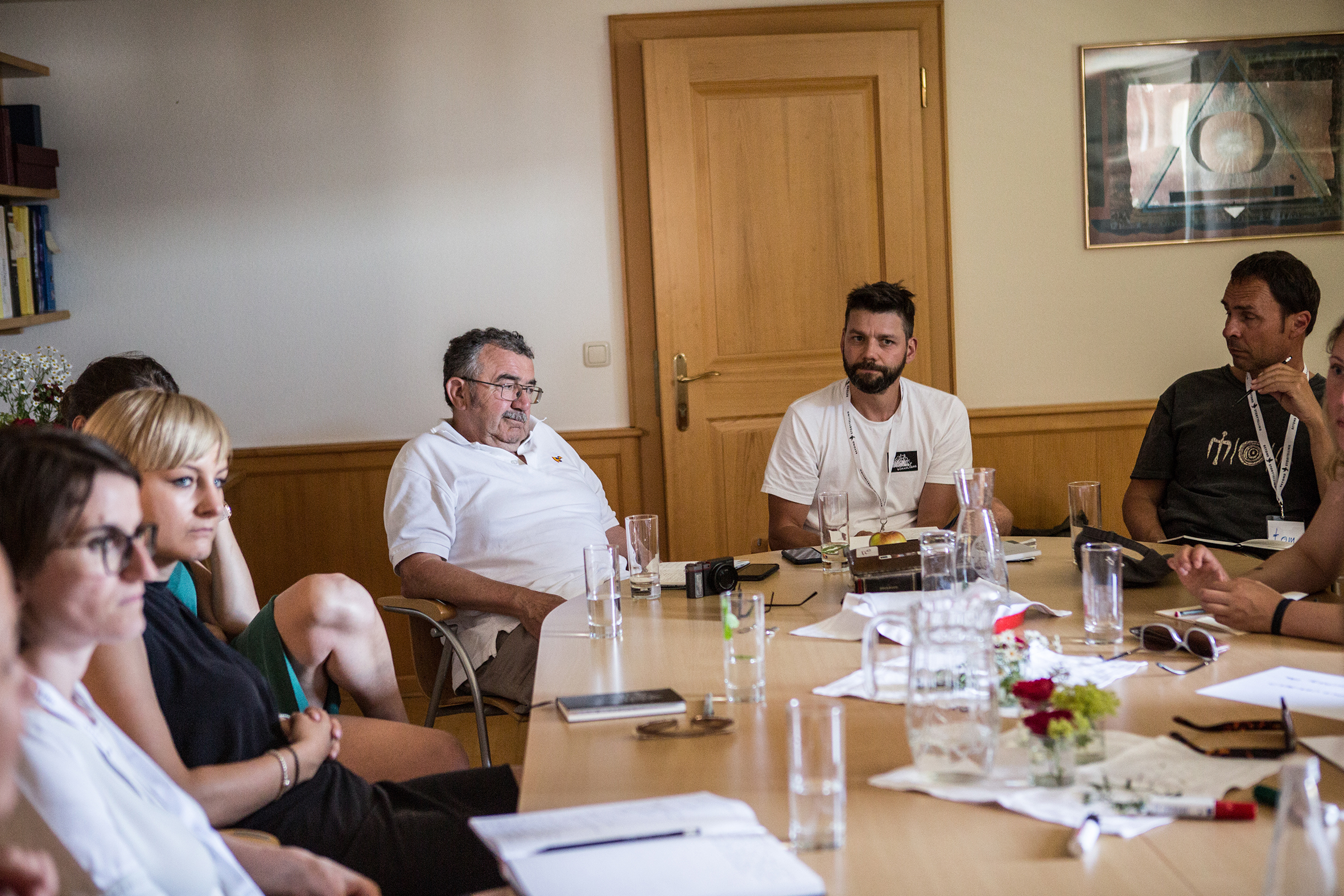

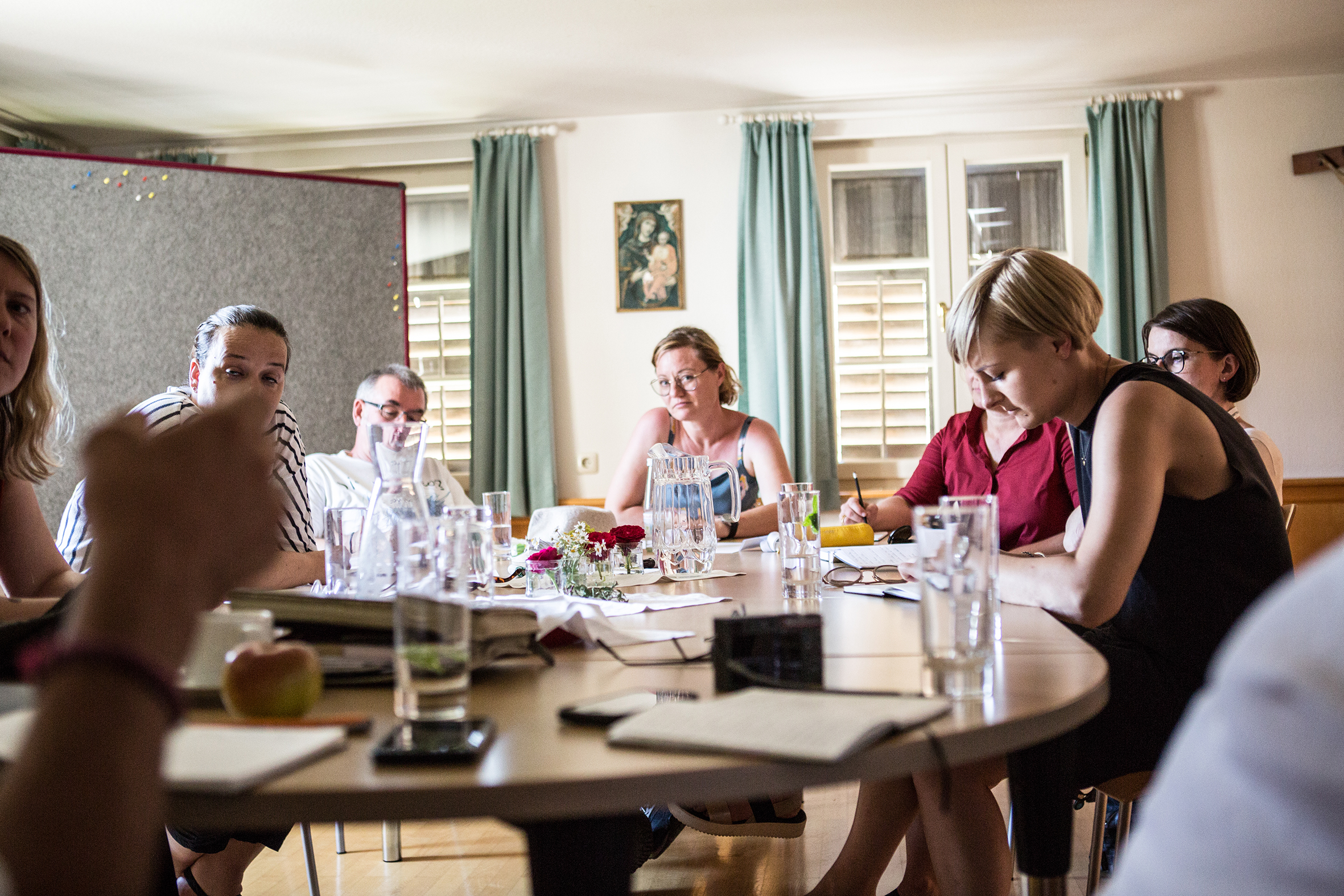
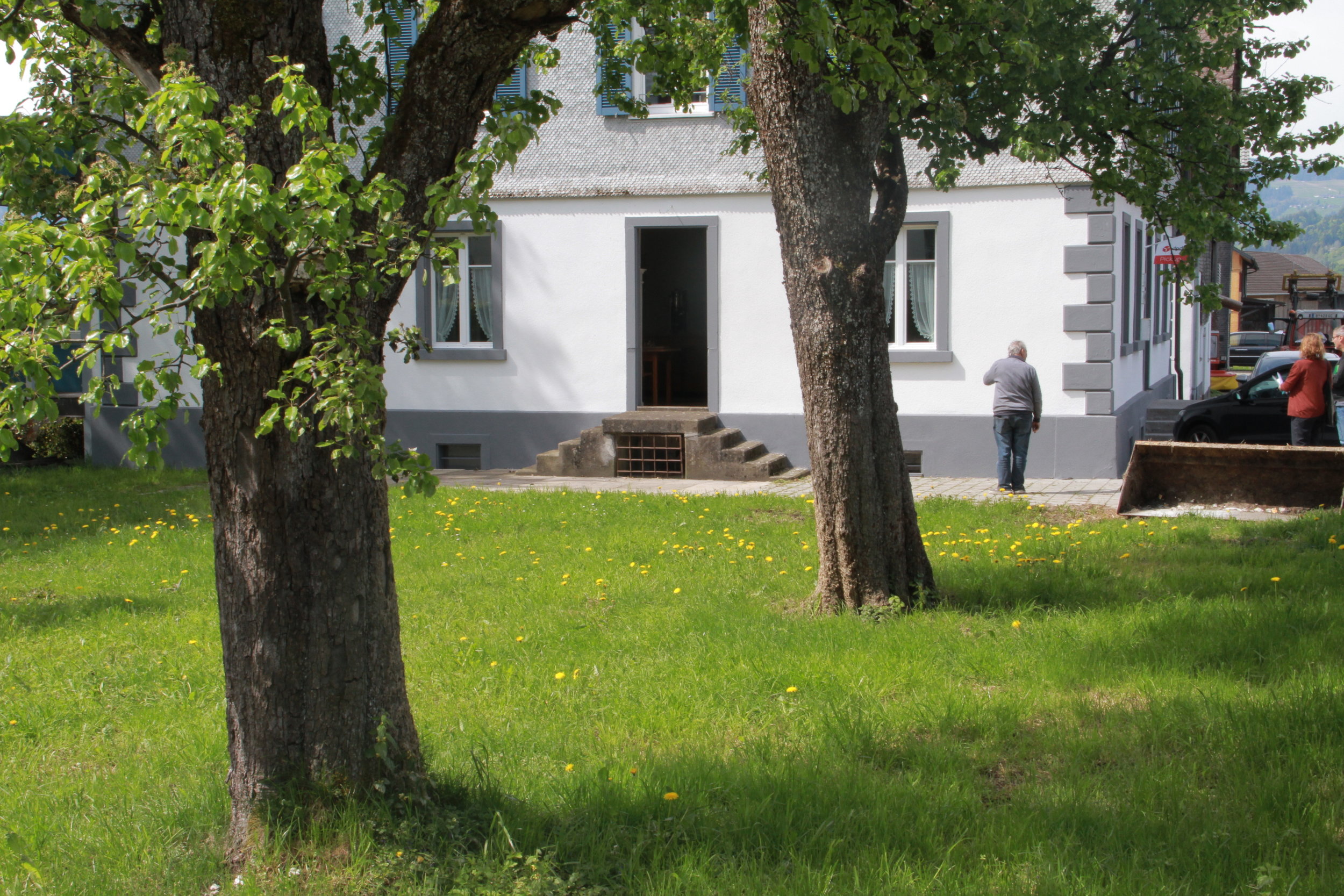

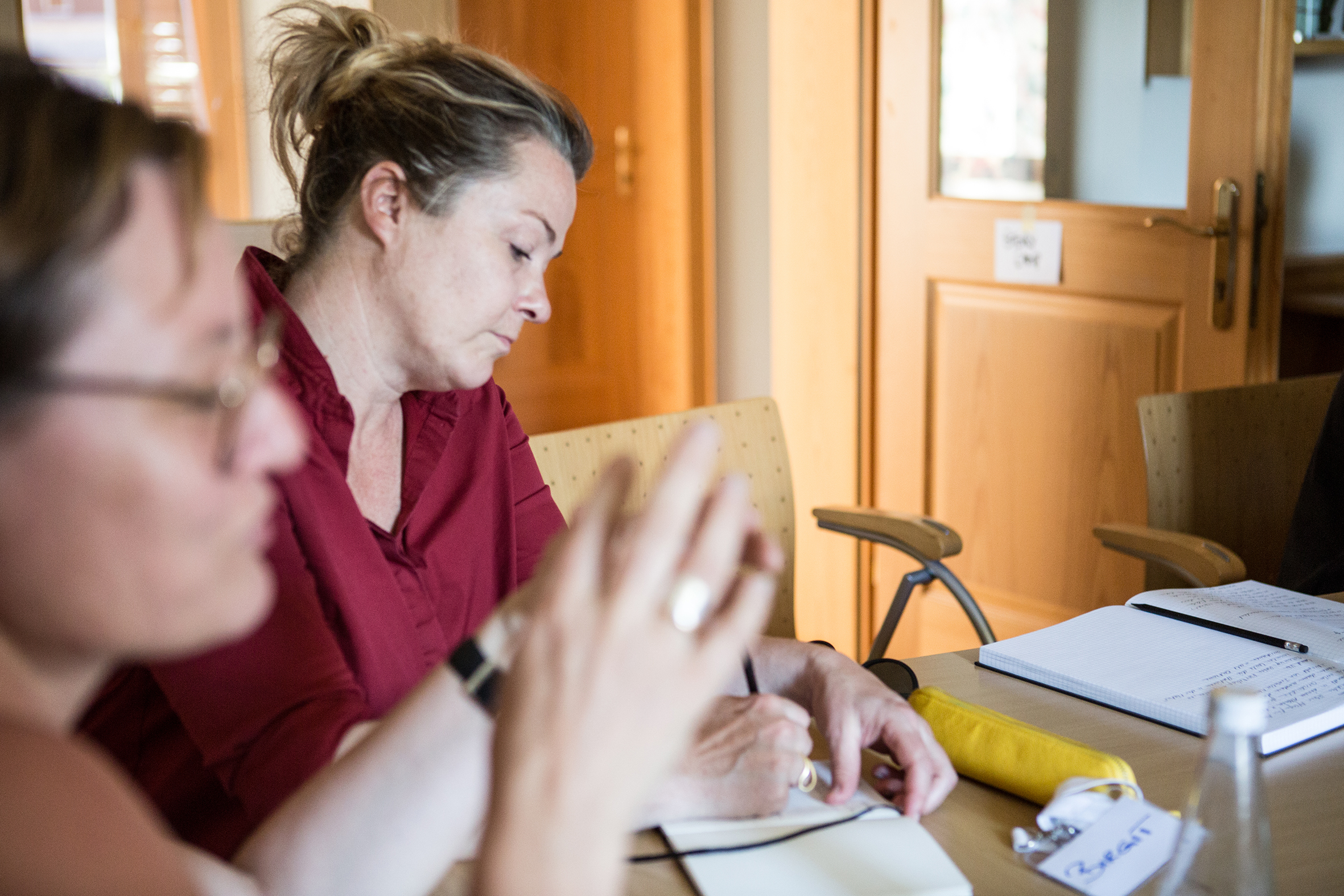

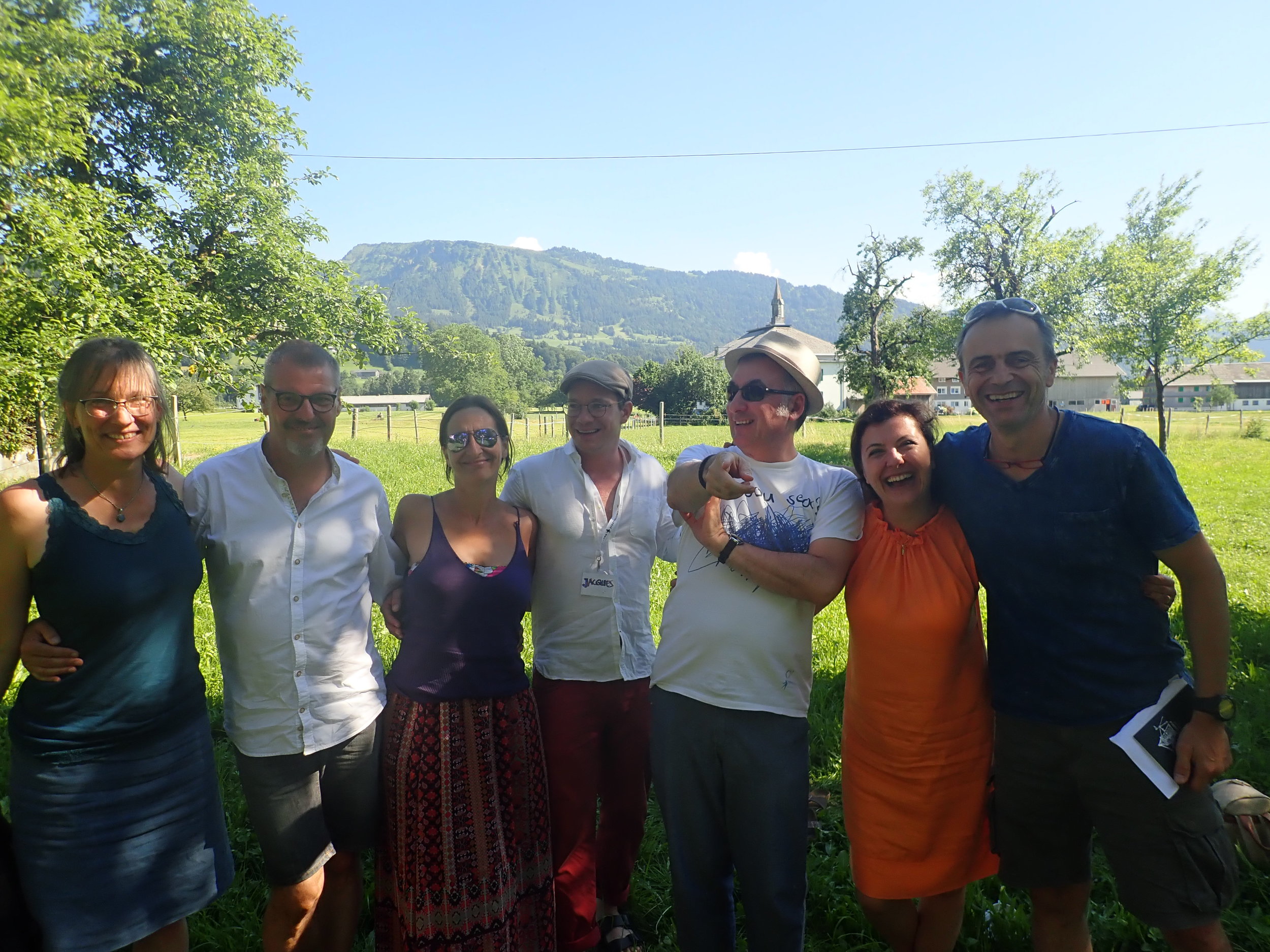


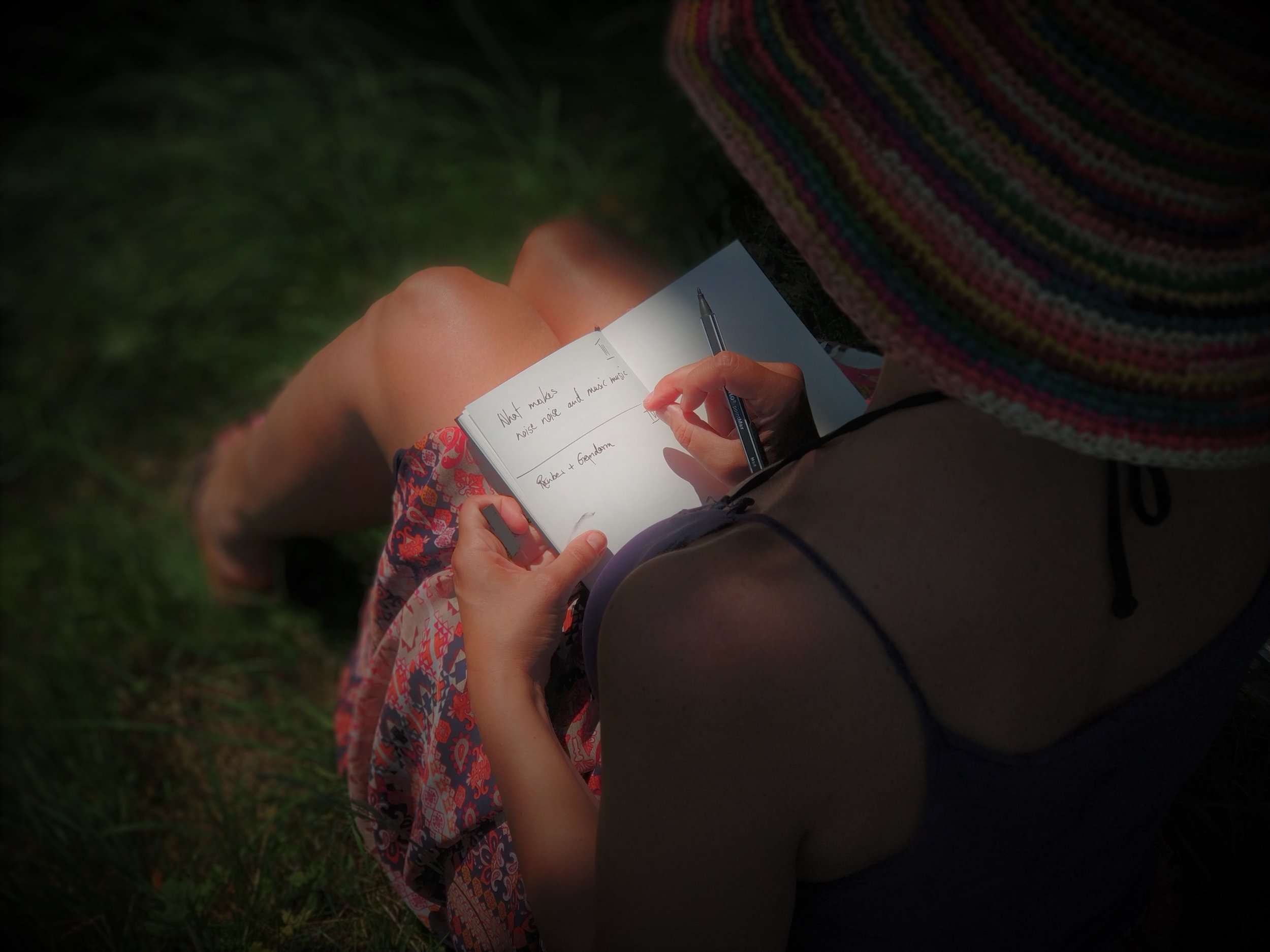

The wonderful Roswitha Schneider had an “eye” on us throughout the StoryCamp. And she did a phantastic job capturing the different moments, settings and the emergent quality of our time together. Enjoy!
This year we took the chance to capture some voices and collect feedback for the StoryCamp in Lingenau. In a short questionnaire, we asked our participants to describe the event in a few words. We are touched and moved by what they had to say, but read for yourself:
Das StoryCamp war für mich persönlich nicht nur sehr lehrreich, es war verblüffend … Eine ganz neue Erfahrung mit vielen neuen Perspektiven, wertvollen Erfahrungen und unglaublich tollen Geschichten vieler wunderbaren Menschen. Dass dieses schöne Format vor meiner Haustüre stattgefunden hat, macht mich auch ein bisschen stolz!
Sarah Preuß
The StoryCamp gave me the chance to connect with likeminded people from all over the world, tell stories together, listen to theirs, expand my curiosity and discover a wonderful village full of great storytellers and magic places. I'll keep a lot of great memories and magic moments in my heart.
Ingo Angres
Wärme und Wohlbefinden. Begegnung und inspirierender Austausch. Lernen und Entwicklung. Es war zauberhaft!
Martina Eisendle
Das BST-StoryCamp öffnet seine Manege zwischen Chaos und Ordnung, dort wo sich bekanntlich die besten Ideen, schönsten Gespräche und ergreifendsten Erfahrungen finden. Ein erfrischendes Format voller inspirierender Persönlichkeiten.
Semih Morel
Ich kam als Fremde, die bis dahin nicht mit der Storytelling-Szene im Unternehmensumfeld vertraut war und ging als reich beschenkte Frau, die in allen Lebensbereichen durch dieses Camp und alle seine Teilnehmenden gewonnen hat. Besonders der offene und authentische Erfahrungsaustausch, die Menschen und ihre persönlichen Geschichten, hinterlassen bei mir einen warmes Gefühl der Fülle und eines zauberhaften Punktes der Übereinkunft.
Karin Hinterleitner
Das StoryCamp in Lingenau war für mich eine sehr bereichernde Erfahrung. Wegen der inspirierenden Teilnehmer, der offenen Diskussionskultur in den einzelnen Sessions und dem unkonventionellen Tagungsort inmitten des Bregenzerwaldes.
Friederike Hehle
Bereits die Anfahrt mit Christine war interessant und geistig anregend. Ich traf in Lingenau eine offene, kollegiale Stimmung, mit Möglichkeiten zum Rückzug oder um sich je nach Bedürfnis zu engagieren.
Meine anfänglichen Befürchtungen bezüglich Kontaktschwierigkeiten verblassten sehr schnell und liessen meine Neugier spriessen.
Fredy Schwyter
Es fühlte sich an wie eine große, kreative Blase, in der wir uns die vier Tage über befanden. Viele Inputs, schöne Gespräche und wertvolle Gedankenanstöße!
Katrin Preuss
A unique format with the following ingredients
* a rather small group of people (40)
* being together for in total 3 days
* beautifully framed by the facilitation of the BST Core Team
* made unique by the contributions of ALL particiapants during the session * the marvellous village Lingenau with all onsite places and people being a powerful Co-Facilitator
Susanne Conrad
Die Veranstaltungen von Beyondstorytelling sind für mich gesetzt. Es gibt eine Geling-, Lern- und Erlebnisgarantie. Man geht reich beschenkt aus den Konferenzen. Neue Methoden, mehr Wissen, spannende Kontakte und das ganze mit einer freudvollen Leichtigkeit. Fühlt sich nicht an wie eine Konferenz, sondern eher wie Urlaub.
Karin Kiesl
Ich habe selten bei einer Veranstaltung soviel mitgeschrieben, wie in diesen drei Tagen. Es war eine sehr dichte, intensive Zeit mit interessanten Menschen, die viel zu sagen und einzubringen hatten. Und ich bin mit dem Gefühl heimgekehrt, so viel mehr vom BST Camp mitgenommen zu haben, als ich selbst beitragen konnte.
Thomas Lutz
The experience of a real passionate and inspiring sharing community that helped to grow ideas, open perspectives and seed new thoughts.
Barbara Hunter-Lemke
StoryCamp Lingenau? Eine Heldenreise! Abtauchen ins Unbekannte, im Bedeutungsgewebe verloren gehen, Verbündete finden, das eigene Narrativ de- und erfolgreich wieder rekonstruieren, das Elixier finden und Rückkehr in die "normale" Welt – aber mit verwandelten Augen, Sinnen und Werten.
Patrick Kappeler
Around Pentecost I was very shaken by the awareness of the amount of change that was coming. In our lives, in our communities, in our immediate environment. I asked myself what role storytelling should play when so much can collapse. In the story camp I found traces in which I can set my steps and people with whom I can walk hand in hand. The future is today. It needs tribes, trust, connection, courage, rebellion, good questions, values, closure and openness on which everything is based, both at work and in private life. My "one-word story", with which I will continue to work from now on, is: Symbiotism.
Astrid Nierhoff
It's hard to capture in word something that engages the whole person, not just the mind. We have created a community in which co-creation happens effortlessly, inspiration flows and every story finds its place.
Katarina Veselko
Sometimes
you enter a space
meant to transform you
Kerstin Gollembiewski
A room full of ideas and inspirations that connect and become something bigger
Melina Garibyan
The StoryCamp was the most inspiring event of the year for me. Within the circus everybody could create their own theme-session resulted in interesting input and outcome. Everybody brought their creative souls, open mind and heart.
Carla Wijbrandts
Unsere lieben Kollegen Dani Rütimann und Patrick Kappeler von der Storytelling Akademie haben im Rahmen des StoryCamps Lingenau eine Reihe von Podcasts mit TeilnehmerInnen und Mitgliedern des BST Kernteams geführt. Die Podcasts decken unterschiedliche Themenschwerpunkte und Themenfelder ab und beleuchten so ein breites Spektrum des Arbeitens mit Geschichten und den narrativen Denkens.
Hier die bisherigen Podcasts vom StoryCamp in Lingenau:
Patrick Kappeler, Mitbegründer der Storytelling Akademie, traf sich heute mit der Psychologin Christine Erlach, die zu den Pionieren der Narrativen Arbeit im deutschsprachigen Raum gehört.
Christine Erlach hebt verborgene Wissensschätze, Werte und Haltungen und macht sie für Organisationen konkret nutzbar....
Wolfgang Tonninger sieht das Narrative als eine Brücke zwischen Kreation und Beratung. Aber auch als dialogische Grundhaltung, die ihn in seiner Arbeit mit Menschen und Organisationen begleitet.
Was das in seinem Alltag bedeutet, erzählt er uns im Aha! Podcast.
L'heure bleue an der wildromantischen Subersach! Patrick traf sich mit dem Organisationsberater, Coach und Facilitator Jacques Chlopczyk an der alten Bahnstation Lingenau und sprach mit ihm über die Entwicklung neuer Narrative und Metaphern für eine nachhaltige Zukunft.
Wohl- statt Wertschöpfung war das Schlagwort...
Ying Zhou inspiriert Menschen dazu, ihr individuelle Einzigartigkeit zu leben und ihr ureigenes Talent zu entfalten. Sie ermutigt zu Kreativität und Zuversicht, die Herausforderungen des Lebens in Komponenten der eigenen Talentschmiede zu verwandeln. So wie Muskeln erst durch Gewichtstrainings wachsen, wächst der Mensch erst an seinen Herausforderungen.
Heute sprach ich mit der StoryWorkerin und Prozessbegleiterin Steph K. Bachmair über das kleine "Opfer" welches alle Storyteller auf dem Altar der Verletzlichkeit erbringen müssen, um genuin Geschichten erzählen zu können, die Menschen berühren.
Ob auch Führungspersönlichkeiten in ihrer Rolle als Führer verletzlich sein müssen? Die Antwort findet ihr im Podcast.
Last but not least! Unsere letzte Perle aus dem StoryCamp Lingenau 2019!
Heute sprach ich mit Joanna Sell, Intercultural Narrative Coach, Trainer und Facilitator über die Faszination interkultureller Narrative und wieso ein einziges Wort manchmal eine ganze Geschichte beherbergen kann.
Wie sich Führungspersonen, Manager und Kommunikatoren in unbekannten Universen orientieren, bewegen und kommunizieren können, verrät dir unser letzter StoryCamp 2019 Aha-Podcast.
Die Podcasts der Storytelling Akademie werden hier veröffentlicht. Reinhören und folgen ;-).
Sometimes
you enter a space
meant to transform you.Kerstin Gollembiewski
Lingenau is a poetic village. It invites the quick and messy scribbles of pencil on paper, trying to capture the moment's inspiration. Poems flutter around our heads and hearts like birds, and from time to time one loses a feather – a one-word story, a metaphor, a word play, a rhyme. Here and there, one of these feathers lands in the lap of a circus artist. And then, if we're lucky, the artist freezes the idea in writing, to share it with the rest.
Sometimes, it's just a distant memory of a lyrical story that's touched us once before, and we search through our mind (and sometimes the »world wide web« – now isn't that a wonderful phrase, too? The World Wide Web?) to find the words that had been said before. And sometimes, the verses fly away again to find another heart to land in.
These are some of the ones we've managed to capture and share.

Photo by Yannis Angelis
An emergence of the following poem by Stephanie Bachmair:
‚what makes noise noise and music music?
when meditation dances with prayer
gendarmes with villains
and the priest with fallen-in-love’ ones
then we moved
in the good direction
A playful, yet powerful invitation. It is a poem by Hafiz that came up in a session on poetry suggested by Barbara Hunter-Lemke. The image of a full table at a party, where there is enough for everyone, if everyone brings a little something, became a metaphor for our co-creation, for the space in which all of us can give and take, and the abundance of our gifts.
At This Party
I don’t want to be the only one here
Telling all the secrets –Filling up all the bowls at this party,
Taking all the laughs.I would like you
To start putting things on the table
That can also feed the soul
The way I do.That way
We can inviteA hell of a lot more
Friends.By Hafiz
With the table full, deep conversations sparking and friendships beginning to form, our stories begin to flow. The people here are special, because they listen. Really listen. Not just wait for their turn to talk, but stop and step into your story for a while. Walk with you. Let you enter their world as they enter yours. This poem was shared my Yannis in a big circle at the end of Day 2. It's a beautiful short story, written by Nayyirah Waheed.

Sharing stories, we expand. There are no borders, we flow out and embrace freedom of being endless, disrupting the order. Like a coffee stain.
This is a poem Stephi read in a big circle … It’s the only poem in German I’m sharing here, and we wouldn’t want it to be lost in translation. So here it is, exactly how it landed on paper in the moment of emergence.
Der Kaffeefleck by Stephanie Bachmair

I love how sometimes, poetic just sparks into life from throwing words into the air and catching them while they fall. This is how the following poem came to be: it originated in exploring the question of bringing together a multicultural team. Jacques, Stephi and I were walking up a narrow way through the woods on a hillside above Lingenau, freely associating. Just before we reached our next bench, Jacques managed to grasp some of the words we've been tossing around, and let them land in his notebook. (Jacques’ original can be found here)
Dancing on barbed wire
Mending broken things –
The grace of healingJacques Chlopczyk / Stephanie Bachmair / Katarina Veselko / Lingenau
I believe what enables such wonderful creations to come to life so effortlessly is the community. StoryCamp, to me, more than anything, is a community of people dedicated to listening deeply to capture the untold and letting stories emerge, and brave enough to take the quill in their own hand and write the stories we wish to live. And for that, we need to feel like we belong somewhere. In the final round, I said the treasure I found was being held. A circle of hands.

Photo by Andreas Liebhart
COMMUNITY
We are all longing to go home to some place
we have never been—a place half-remembered and half-envisioned
we can only catch glimpses of from time to time.Community.
Somewhere, there are people
to whom we can speak with passion
without having the words catch in our throats.
Somewhere a circle of hands will open to receive us,
eyes will light up as we enter, voices will celebrate
with us
whenever we come into our own power.Community means strength that joins us our strength
to do the work that needs to be done.Arms to hold us when we falter.
A circle of healing. A circle of friends.
Someplace where
we can be free.by Starhawk
We have a community. We have the strength do to what needs to be done. And now, the Call, shared by Yannis in our final round. To gather up our gifts and treasures and go do something. Change. Transform. Grow. And take the world along.
Did you get the call?
Did you get the call? I did.
Did you hear your name in the middle of the night?
That voice egging you on, nudging you to awaken.
The silent alarm vibrating through your heart,
bursting your confusion, this nameless knowing.
This tumult of soul seeking truths
Are there words for this disposition?
Come out, add to the dialog this hiding no longer suits you.
You’re on the brink of transformation
and you need to jump in or defy gravity,
and float into the collective of indie souls.
Or, into the cast of nameless and unidentified
seekers of change, your new family.
So go out.
Be the change.
By doing, sharing, creating.
Walk the walk and talk the talk in your gifted way, your language.
Paint the story, write the story, sing, dance, play the story.
Pass it on, teach it, grow it, word by word, by mouth.
Be the person you want to be.
Be the person you need to be.
Take your hat off.
Sit down and journal this pause.
Put on sneakers, grab a towel, and run this moment.
Pick up your mat, find space, and meditate this moment.
But however you do what you do, carry someone with you, forward.
Talk to them, touch them, share fears, share joys, speak ideas.
Collectively we cannot effect change by only watching.
We are the town criers.by DelRita Butler
We are now home. Back to our ordinary world, carrying all the treasures. One story ends here. And yet, we have received this call. We answered it with a passionate »yes«. A call to a new adventure. A bigger one, maybe. To change the world through stories, as some have humbly shared in our innitial burning questions. The world is reaching its hand out, inviting us to dance. So let's dance.
We are dancers
What is dance
if not touching the world in a new way
if not letting yourself be moved by another
if not listening to what your body has to sayWhat is circus
if not a collection of mistfits and freaks
if not finding a like-hearted brother
if not turning a flaw into the treasure one seeksWhat is story
if not hearing the whispers between words
if not the shortest distance to the other
if not gently voicing the unheardWhat is Earth
if not humanity's most precious chance
if not the passion of a Wild Red Mother
if not an intimate invitation to danceWho are we
if not a flock of whirling dancers
weaving stories with each other
exploring questions with no answerby Katarina Veselko
*Title photo copyright Roswitha Schneider. Thanks to everyone who contributed the poems and photos used in this post.
This text is courtesy of Cristina Correa. It´s her story. We are happy to share it.
When I arrive home after BST Storycamp Ligenau 2019, my hometown Santiago was possessed by the eclipse madness. The second of July the moon covered the sun almost completely and we could see it with paperboard sunglasses. Eclipses were messages of the gods for some ancient cultures, bringing good or bad auguries. In astrology they are symbols of openings and closure. That is my feeling after this few extraordinary days in Lingenau. Something is completely changed and still the same about myself.
In that bucolic scenery at the foot of the Alps, I became part of a nomad tribe of jugglers and It felt like home. We were creating, in an open format, our way to fall in love with stories. We did that in many different sessions ranging from questions around politics, organizational change to questions concerned with the very foundations of what stories are.
The session that perhaps had more impact in my future was about how to enter in a world/story.
Wolfgang Tonninger was in charge of leading this quest, that at the end resulted in a quest for a very fresh beginnings for my self-fiction novel. We started with an article about the Californian wildfire that destroyed the settlement called Paradise. A tragedy that turned the settlement into ashes.
And the journalist made quite an entrance, literarily speaking, showing us the image of a man rescuing from the ruins a jewel of his wife. This indian firestone survived, while gold was melted. In just three paragraphs he caught our attention with a metaphor of religious imagery and the foundation of this city, built at the beginning of gold fever in that region decades ago.

Entering a story must be a sensual/essential thing, we all agreed. Then we started to share stories that we thought can be useful for this amusing exercise, and we speed up into a perfect circle in which everyone could participate (wich). That was for me the most precious jewel of my Journey in BST19 Storycamp Lingenau.
At start I gave them some cues about the story. In the opposite of pitching, I just threw separated facts into the air. Instantly, the magic of storytelling did its job. My new german speaking friends were totally hooked up, making this story their own.
The novel centers around a woman in the search for her grand dad that fled the country as his sexual orientation was revealed, being gay in socio-political context in which there was no space for it, becoming a cheerished cook and an esteemed entrepreneur. The woman herself has just broken up with her boyfriend at that time. Searching for the traces of her uncle and a new beginning for herself, she reveals different aspects of her family story.
What is wonderful about these openings is that you don’t need to see the whole picture. You can feel the gaps just reading these different beginnings. This are some of the images that I will always treasure in my heart:
1. She is back from Pucallpa, Perú. She goes to bar and sees his boyfriend, chatting and drinking with a male friend. From thi very moment, she realizes he is gay.
2. Rudy is smoking, and the way he is sustaining this cigarette is kind of delicate, almost feminin. He presses the remains in an ashtray. Now she knows. From this moment, she revisits many other moments in his relationship and she thinks about what she never wanted to see…
3. What I did not know in the moment I was throwing my clothes into my backpack in this shabby hut in the jungle in Perú was that my grandfather did the same in that very day 55 years ago. He was not at Perú but in Santiago it was early morning, just after the military was marching in the streets once again and the political tension was rising. Even if my grandfather was using the political turmoil to enter Argentina as a political refugee, it was not the reason why he disappeared from the life and stories of my family. Last night, after another sad fight with Paolo I decided to head back for the south.
4. Impenetrable darkness. She listens absolute silence in the middle of a rainforest. The sensation of being lost. She want order in her life, but she had chosen poorly, throwing herself into the chaos of this silent jungle.
5. Shots are heard, there are soldiers in the streets. At the same moment a door knocking is heard and a woman yelling: "¡Jorge, open the door!".
6. Burned photographs of the family leads the main character to this one photo of his former boyfriend.
7. She meets the lover of her grandfather at a bar. They have an interview in wich none of them feels like talking.
8. Conversation with her grandpa. After a chapter about this encounter, she says: well, that never really happened.
9 .Does every journey needs a destination? Does a family needs its secret story? She is in the train looking at her own reflection in the window.
I can't reproduce all beginnings here in full length, but what is important to me as a writer, was how much different viewpoints and different ways of entering this story sets the stage for what comes next. The freedom to experiment with different approaches to set the scene.
For all our new fresh starts, we will never lose the thread. Now is my turn to take this inspiration further in the rewriting of my first novel story. Thank you Lingenauers!
Link to the Zeit article (paywall): https://www.zeit.de/2019/24/kalifornien-waldbraende-wetterextreme-zerstoerung-wiederaufbau-paradise
Picture Credit: Andreas Liebhart
The word came to me from a podcast I listened to on my way to the StoryCamp in Lingenau. In the podcast, three historians discussed the peace treaty negotiated in 1919 in Paris, ending what is commonly referred to as the first world war. The discussion centered on the parts of the agreement and the circumstances around it that made it one of the root causes for conflicts throughout the 20st century.
What captures me about the word is that it is still used as a shorthand to refer to a very complex story: the historians named a few references in which the word “Versailles” was used to describes situations in which a country or a political power was forced in a situation that necessitates a strong response in terms of counter-aggression. A reaction that was forced through the terms of a forced agreement. Effectively situating the responsibility for the aggressive response with the parties involved with the forced agreement.
A few days after the camp, the word lingers around my mind as an example of what one could call a “one-word story”, a term inspired by my colleague Joanna Sell. One-word stories in my understanding are words that are so soaked with a particular narrative that they become a shorthand for a whole story.
Without having searched for different examples, the notion of one-word stories reminds me of a quote from Julien Rappaport:
„While some community narratives are quite direct, many well-known narratives are coded as visual images, as symbols, as stereotypes, and as performances of behaviour so ritualized that we may be unaware of the narratives we implicitly accept and enact, [...]. Underlying much of what we know, and can recall, are encoded stories indexed by certain cognitive handles. These indices are like headlines in a newspaper account. They are cues to the underlying story. They affect both the target and the source. Overlearned stereotypes primed by adjectives or coded words are the handles to underlying stories (Rappaport, 2000, S.5)
So, one-word stories are basically these handles for the underlying stories: stereotypes come in that form. Large battles take on a meaning that resound universal tales: Waterloo, Hastings, Stalingrad. Social dynamics are framed in that way: the wave of refugees and so on.
What strikes me is the power of these one-word stories to frame a complete discourse or dialogue with one word. A word that can tip the scale of dialogue in one way or another by situating the conversation in an engrained, widely shared, image-laden narrative.
During a walk at the Story Camp, I shared a story with an old friend. A story about how I am reluctant to give a name to a certain situation. I realized that this reluctance was keeping my mind busy and made me unstable in how to relate to that situation.
Naming a story is an important part of narrative therapy and re-authoring practices. Naming a thing is making it real. Giving substance and form to something that did not have a shape. From an unnamed feeling or perception, we discern a Gestalt.
Naming is an act of creation which entails all the references that make up the web of meanings leading from and to the name. By naming we summon the context to the stage that the story will unfold on (consciously or unconsciously – but that´s another story).
But giving a thing or a story a title or a name has more implications than that: it is an important part in a process to relate to that story. Naming is the singular step that can make the difference between living into a story and the decision to live into it. The distinction between a story you choose to tell and live and a story that tells you.
It puts the story outside of a person or a community and gives it a live on it´s own. A problem becomes a problem story - ready to be told differently. A solution becomes a solution story – ready to be lived into.
Naming a story might turn that story from a cold into a hot story. A cold story is a story that we unconsciously live into, a story that impacts the way we are in this world without having awareness of it. These stories might be rooted in our biography, in our society or the organization we are with.
Hot stories are stories that we are conscious of, stories in the making, stories in transformation (The distinction of hot and cold stories is borrowed from George Lakoff and Mark Johnson, probably inspired by Claude Lévy-Strauss` distinction between hot and cold societies).
We need cold stories and metaphors. We need to have structures of meaning that guide us through the world. As sign posts in the land of possibilities. That we can rely upon while thinking fast. That we can rely on in exploring the unknown.
Every transformation moves between cold and hot stories. It is about “unfreezing” (Kurt Lewin) the clay the story is made of and shape and relate to it in a different way. Warming it up to form something new.
When I started this writing, I did not know where it will lead me. Posting it on the slack channel for the StoryCamp, I got some valuable impulses about how to continue. About the complexity of the distinction between hot and cold and between freezing and unfreezing.
I will borrow a term coined by Wolfgang Tonninger in his first reflection on the StoryCamp: as people concerned with transformation and change, we are attorneys of manoeuvrability. Our concern is and should be about the flow of the story and restoring the ability to maneuver, to act, to set one foot before the other, unearthing the potential to remove obstacles for development and new insights:
In some cases, this involves naming a story so it can be left behind, to heal and to move on. In some cases, it needs a re-naming of an all-to-familiar story, to find a different opening, a different meaning in it. Sometimes it needs a name for a story not yet written, to clear the path, to open doors into the unknown, to think, feel and act differently.
Being present with the process of naming, re-naming and un-naming is the work. Opening cracks, so that light can shine. Opening passages, opening doors. Story-Work.
When I arrived in LINGENAU one day before the camp started I was full of creative tension. A tension which was fueled by one nagging question: How light and enriching and – most important – loved will be the baby we have been carrying with us for about 9 months?
This was the day before the storycamp started. We were doing some final scouting, some attuning, talking, laughing, swimming, connecting and finally deep listening to the Subersach and the woods voices in the night and alone.
Dann der erste Tag. Schwimmen, Kaffee trinken, Zähne putzen am Fluss. Bevor es hinaufgeht ins Betriebsame. Flipcharts werden geschrieben. Wir kümmern uns um die letzten Details, die so wichtig sind. Kleinigkeiten überall, die es vielleicht ausmachen werden. Egon schaut vorbei, der Hausherr. Und seine Frau, die Elsa, bringt noch ein paar Blumen für die Fensterbänke im Engel. Isabella und Sabrina und all die Heinzelweibchen. Our plenary room starts blooming. As you can see I like to switch languages since LINGENAU – continuously reflecting how meaning is made and celebrating the slowdown which comes along with. This is the one side. On the other side I started to acknowledge the translator in me who is discovering new traces to hit the point – playing with connotations and backstories. Storycamping for me turned out to be the embracing of detours – even when translating.
3pm. Registration. People are arriving. 4pm. The beginning and us finally jumping into the water. Welcome. Willkommen in Lingenau. Bienvenido en este pueblo de cuentas. I am overwhelmed how the narrative community is ignoring borders, continents. Can you see our baby? My name is Wolfgang. Wulfgäng. I will re-invent myself in front of you. Transforming into a treasure hunter, a collector of things which make my heart beat faster. Are you ready? To perform yourself through stories? To go beyond your expectations? To embrace the richness in this circus like camp and build on it? To connect? To transform as well?
My beloved John Berger comes to my mind when I look at all the narrative explorers gathering in this room. And “the motorbike with its headlight zigzags up the mountain. From time to time it disappears behind escarpments and rocks and all the while it is climbing and becoming smaller. Now its light is flickering like the flame of a small votive candle against an immense face of stone. For him it’s different. He is burrowing through the darkness like a mole through the earth, the beam of his light boring the tunnel and the tunnel twisting as the road turns to avoid boulders and to climb. When he turns his head to glance back — as he has just done — there is nothing except his taillight and an immense darkness.”
Ich sehe die Lichtkegeln, die in der Nacht tanzen. Und höre die Musik von Puma und Hanno. Den Schmetterlingssong, der meine Hymne wird für diese Tage. Wir sind angekommen. Irgendwie. Bunt zusammengewürfelt auf einer Terrasse ohne Ufer. Atmende Silhouetten. Im Licht der Erzählung herausgeschält aus der Dunkelheit, die uns umgibt. Die Grenzen verschwimmen. Alles ist Zirkus. Alles ist angerichtet für die Überschreitung, die wir wagen.
Neuer Tag. Ich erwache am Fluss. Und nehme seinen Rhythmus auf, bevor ich ins Camp wechsle. Marketplace of ideas. Welche Fülle? Wieviel Ordnung in diesem Chaos? Es scheint zu gelingen. Wir öffnen uns hinein in Räume, die aus Dialog gebaut sind. We are opening ourselves into spaces built out of dialogue. Alles auf Augenhöhe. The butterfly is guiding us. Hear! and now. Ich lob den Tag, bevor es Abend ist. Schnitt.
The circus is moving (even my car is moving by itself!) as we are moved. And so many treasures on our way. The woman who jumps out of her garden and tells her story when the story bench is not working. The cautious sharing of moments. The holding space. The laughing together. The giggling corners. The bonfire whispering. The various beginnings. The door openings into the possibility land. Like the wife finding her husband with his young lover, or the empty room of the grandfather in Santiago de Chile 1972 with the sound of a marching mass as background, the girl jumping over the brick wall to attend her gym class, or the lost woman in the Peruvian rainforest: “Suddenly, I was totally lost. The path I was heading for the last hours disappeared. The jungle around me seemed impenetrable. And – what staggered me – it was a jungle without sounds. It was like the rainforest around me took a deep breath in this very moment.” Doors. Possibilities. Inadequacies. Misfits. Matchings. All over. The knots of a network of meanings I discover with my complices around the table.
Suddenly, I hear the word coincidence three times in a row. Coincidences? No! Yes! We are there. The world is opening. Secrets all over. Secret connections. Our stories are transforming coincidences into forks. Thats it. Deciding if the train heads to Rome or Paris. And bridging fragile meanings. Story as a bridge? Like the one from Negrelli down at the Subersach? A bridge which is hanging and carrying itself at the same time? I feel close to this bridge. Also because of its simplicity. And its cinemascopic openings in its middle. Windows from where the reality seems looking at me. Von wo sehe ich mich? Als eine sich selbst tragende Hängebrücke.
Podcasting at the riverbank. With Patrick und Dani. I am neither problem focused, nor solution focused. I am a storyteller. I am an attorney of manoeuvrability. Ein Anwalt der Beweglichkeit. Geschichten sind weder gut noch böse. Aber es gibt Geschichten, die uns fixieren, einengen, und solche, die uns beweglicher machen, beflügeln. Wir können wählen. Und: Wir können zum Autor unserer eigenen Geschichte werden. Re-Inventing ourselves? Umschreiben, wer wir sind? Es reicht schon, wenn wir zu schreiben beginnen. Und zu gestalten. Im Spannungsfeld zwischen Erfinden und Entdecken uns ausprobieren und überraschen lassen. Listen to the “Go Betweens” when you read this ;-) – between discovering and inventing we find our selfs.
What did suprise me the most? I think it was in the sessions I attended. The moments when theoretical reflection naturally transformed into storywork. It was always like a miracle that happened. Smoothly and light like the baby starts moving. Us. And the organizations we work with. We work in. The communities we live. The world. LINGENAU a lab for experiencing transformation? A lab for Wanderlust?
Saturday. Afternoon. When the doors of the camp are closing I am glad that our circus of half-time astronauts, chansonniers kidnapped by aliens, salon owners, samurias, russion dancers, lion tamers, clowns, shape changers, … has no doors just openings.
How do we enter story? And how do we leave storycamp? I am setting sails now with the deep feeling that I am heading in the same direction my heart, my mind and my stomach want to go. Thats a great feeling. I look back to LINGENAU and see just faces. I see the faces and hear the stories whispering. I hear a whispering and feel my heart beating. I feel this beating and see LIN-GE-NAU. Thanks for happening. Thanks for surprising. Thanks for enriching. Me in my endless guises.
Back home, late at night, I am overwhelmed by the night sky. My kids are around me and good friends. My wife. On the mountain tops I can see the bonfires of the midsummer solstice like a chain of gatherings and celebrations. Could this be a secret measurement of what I’ve achieved? Again John Berger gently knocks at the door. I let him in and his quote touches my heart: “We are all storytellers. Lying on our backs, we look up at the night sky. Tracing an imaginary line between a cluster of stars we give them an image and an identity. The stars threaded on that line are like events threaded on a narrative. Imagining the constellations did not of course change the stars, nor did it change the black emptiness that surrounds them. What it changed is the way people read the night sky.”
Whereas the physical treasure chest of Bilbo and Frodo on the return from their journeys to faraway lands was filled with plenty of gold, gemstones, valuable scrolls and powerful weapons, my treasure chest looks much more mundane after I carried them up the stairs into my apartment: facilitation materials, a pack of flipcharts, 35 copies of the new book, a few new ones by esteemed colleagues and a large suitcase with dirty laundry.
Still sweaty from the four hours trip from Lingenau across mostly empty highways and under the blazing sun, I open the door to my terrace to let the air in from the outside. To cool down and feel the breeze.
I feel lost. I am tired and buzzing at the same time. The last days were so full, my mind and heart are still vibrating. And I don´t know what to do with that so late in the night. And even as I wake up the next morning, I just don´t know what to do with myself.
In the heroes’ journey, the homecoming part is an often-overlooked challenge. The protagonist starts her journey from the known world, exploring the edges of it and crossing into the unknown, reaching new territories.
And these territories are both inside and outside the heroine. In exploring the unknown world, she discovers new parts of herself, finding new resources, capabilities, learns skills, making connections, growing and adjusting to the unknown and the challenges it entails. After the journey, she is not the same.
Sometimes I think that all the cars, trains and planes that made travelling so fast and easy robbed us of a very important phase in travelling. We jump from one place to another, from one encounter to the next. Each one of them with the potential to let us grow and learn and start a new story. Yet, we are missing the time to integrate it. The time in between there and here. The time of the slow approach. The homecoming.
While we have been away, our known world stays the same. If not in fact, then at least in the image we carry with us on our travels. Arriving home means to recalibrate and finding a balance between the new and the old.
Maybe it just takes a good night of sleep and a quick look through our notes. Sometimes it needs a serious conversation with someone. Sometimes it needs the patience to let a story unfold: we are so used to have many things available at the click of a button, we sometimes overlook how small impulses can lead to important changes. Just like a seed needs time to grow, ideas and insights need time to unfold and integrate.
Contemplating on the treasures that I carry from the Story Camp, I stumble upon the word chest: isn´t it our chest that holds and protects our hearts?
And yes, this chest is filled with many treasures: the buzzing of the conversations between people who never met just minutes after we opened the camp. The moment the empty agenda fills with topics and questions. All of them so exciting, all of them so relevant that I need to remind myself that there can a joy of missing out. Entering the first session on “What actually defines a story?” thinking I know too much and being carried away by the depth, insights and openness of the dialogue. Experimenting with telling stories in a many ways: sitting on and walking between the benches of Lingenau: deepening my connection to my fellow travelers, the village that is hosting us, the community that inhabits it and the storyteller in me. New encounters with wonderful people.
Sitting on the stairs outside our plenary room at the old guest house Engel, two words come to me. Now, they seem like a title for the themes that moved and captured me in the last days: poetics and politics.
I attended five different sessions over the last four days. Two of them focused on political topics: “Climate change – what´s the treasure?” and “Narration, Politics and Polarization”.
These sessions were both rich and challenging and the same time. Entering the realm of politics means entering the realm of diversity: different viewpoints, interpretations, values and feelings want to be heard and might compete for airtime, acknowledgement and attention. If every encounter has the potential to exemplify new ways of working and being together, these two sessions nailed it: the willingness to listen and to enter dialogue enabled us to make meaning together. To sit in the fire of diversity and let shared understanding emerge so we can harvest our collective insights.
The topic of climate change is so complex and all-encompassing that I often feel overwhelmed by it. Proposing the topic at the camp was a first tentative step for entering a true conversation about the topic. Feeling and testing how it is for me to talk about it. To find a stance and a language for myself in how to approach the topic. This first step was highly rewarded.
The session not only made me even more sensitive to the different sensibilities around the topic but also about the complex mesh of technological path-dependencies and social dynamics around: after all, we are discussion our way of living as a species. Two major points stand out for me from this discussion:
We need to talk about the treasure at the end of the journey of transforming the way we live as a species. As long as the conversation is framed as a fight and about what we need to be stopping, it carries the sentiment of despair and sadness. We will work against something. Yet, what if we can work for something? A vision that ignites because there is something to win? What could it be that lies at the end of this fundamental transformation? In our conversation, a new sense of interconnectedness was the answer: not only with our role in the ecosystem and the production of life on this planet, but also in relation to ourselves, the place we inhabit and our communities. To move from a production system that sees the earth as minable resource to a re-production system for life on this earth.
The narrative of fighting climate change resembles the “monster in the house plot”. We can only escape (sick!) or kill (how?) the monster. We were quite stuck with the plot for a long while in our discussion. What opened new avenues in our thinking was a metaphor shift as the foundation for a new story: If humanity has been dancing on the earth for centuries (at least in the west), exploiting its resources, we now have to dance with the earth, embracing and acknowledging our impact and the complex net of feedback loops and interdependencies.
In the last circle of the camp, out on the grass in front of the plenary, I was surprised by the words I said: that I never identified as a storyteller. That I never got really in touch with the power of the storyteller to create new worlds by creating and sharing a story. I feel different now as the Camp opened me in many ways for the craft and art of storytelling. From the first session on what defines a story, to crafting and co-creating different beginnings for a novel in session four.

Thinking about that now, I have to think of the first circle, right at the start of the camp, where I echoed the quote from Leonhard Cohen “There is a crack in everything, that´s where the light comes in” in the question I shared “Where is the crack?”.
In the following night, I couldn´t sleep and writing down my thoughts, the quote changed to something else: “There is a crack in everything, that´s where the light comes out.” Looking back at this, it seems like a sign for the exploration of the storyteller in me for the next days. Finding the cracks through which some light can shine.
And these cracks have been invited by the people opening different spaces in the sessions to follow. The moment where we moved from an inspired discussion around what defines a story to sharing the stories that move us opened me up. Through the stories shared by my companions, I was able to dig deeper, and find the emotions, conflicts and tension that move me.
And there was the wonderful walk around Lingenau, in which my body and my mouth were invited to tell stories. As the atmosphere is captured in yet another short film, I will only share one small poem that emerged while walking down a narrow path with two beloved friends, playing around with the concept of one-word-stories:

A few days before the camp, we sat down in the core team to capture the ideas and questions for sessions that called us in that moment. One theme that captured me, was the fact that we can tell stories in many different ways. Looking back at session four, it now seems that my call has been answered.
After sharing some beginnings of stories that speak to us, we set out to define new beginnings for a novel in the making by one participant. In the novel, a woman sets out to discover the story of her disappeared uncle while looking to heal herself from a painful split-up with her boyfriend at the time.

The proposed beginnings were as diverse as the people who proposed them: there were cinematic openings of the woman running through a silent jungle stopping suddenly at the end of a path that led nowhere or a wife knocking at the door behind which her husband is with his young lover with the sound of a marching mass of protesters as background.
I remember my joy and excitement before we went into writing these openings. The impatience to try it out. The joy of sharing the beginning I wrote. This joy is the treasure I want to keep. The lust to let some light shine.
There is a small drawing I made at during the first session. It shows a figure with a backpack. On the backpack, the word “Welt” is written. And maybe it is the image that brings together the two words poetics and politics:
Each poetic act, each story, however small it is, refers to a whole world. Each story carries a world with it. It is a seed for the creation of something new. Not all stories will blossom and flourish. But it is the poetic act of creation, the experimentation with different ways of narrating and describing the world that can create an alternative world.
And politics is about alternative worlds, about different visions where we will go from here. Putting yourself out there with your light and telling a different story takes courage. But I think we need more light, more courage and more acts of creation in this time. To find the treasures at the end of the journey.
After I got up this morning, I picked up a ritual I did for the last few months. Some small exercises, a bit of yoga, a moment of stillness. This made me feel home in my body. In a few moments I will start to unpack my luggage. Find the place for the treasures, knowing that for some of the treasures, it will take some time to find their place in my life and work.
Co-creating Beyond Storytelling continues to be a wonderful journey. And coming home to my flat in Mannheim and leaving Lingenau also showed me that I have a home away from home. A home made up of a community that embraces openness, the aspiration for digging deeper and wider and taking unknown paths. A community in which trust and co-creation, connection and creativity, professionalism and commitment to detail and quality go hand in hand and form a virtuous circle. I came home.

Be gentle in your homecoming. Let it be a seed for new stories, new worlds, new journeys – inside and outside.
Subscribe to our newsletter and connect with a community that grows together.
Discover stories, insights, and perspectives from our global community. Explore what drives us and the people we collaborate with.
Do you have any questions about our work? Or would you like to contribute and become part of our network? We’d love to hear from you — just reach out at info@beyondstorytelling.com